PART 3: THE PLOT RECAP: ACT 2
The Tutorial Frog shows up and explains the premise that will define the entirety of Act 2. Everyone you've met is trapped in this realm, they explain, and has been for many many many many many many eons. "Seeking for release, for purpose, for a meaning for far too long." Now that you have your other arm back, you can actually fight back in battles, catching two notes of the same color (one in each hand, you see) and throwing them back at your opponent.
The Frog (and a Forest Spirit) asks you for a big favor: to end the world by killing everyone in it.
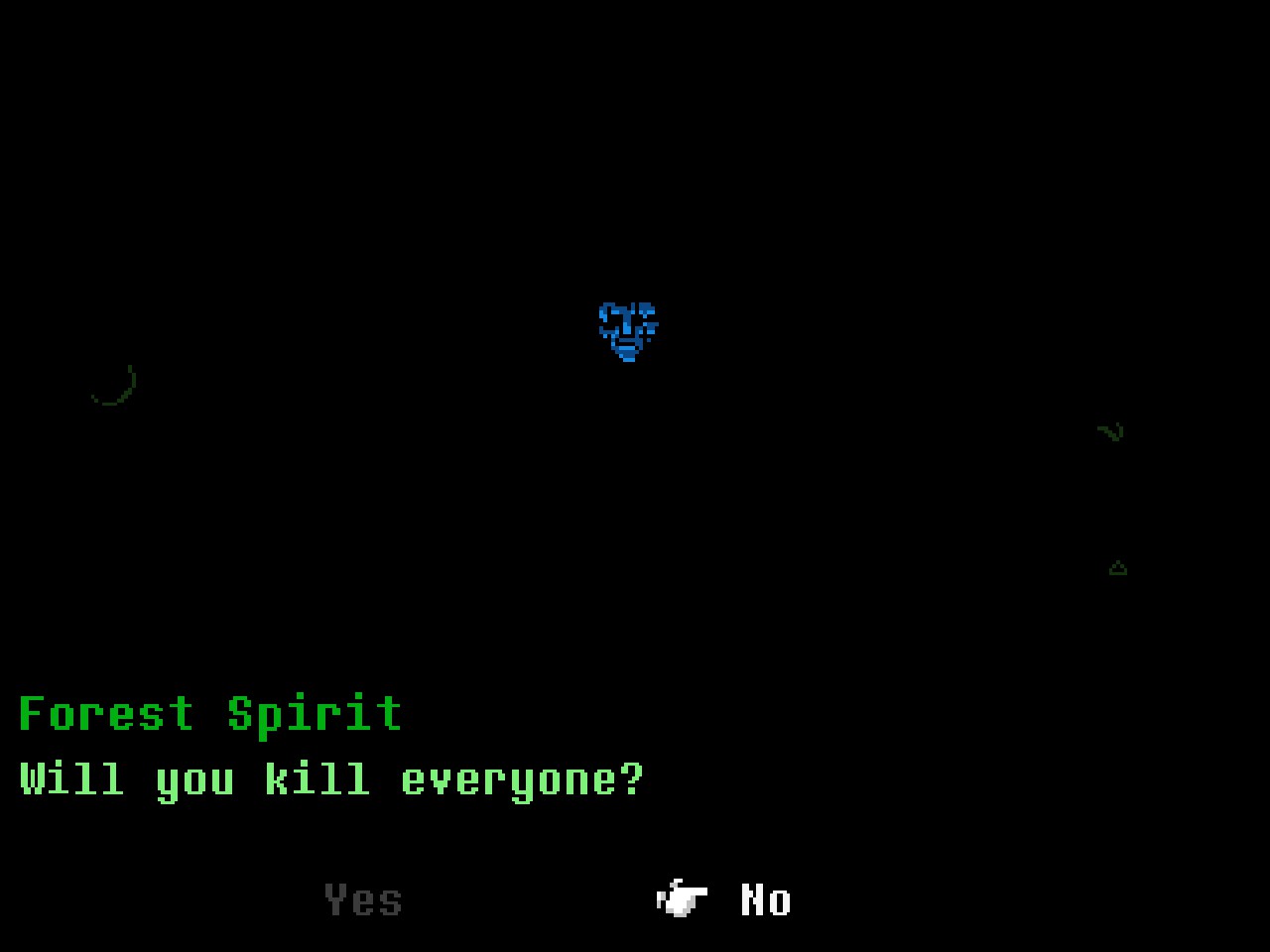
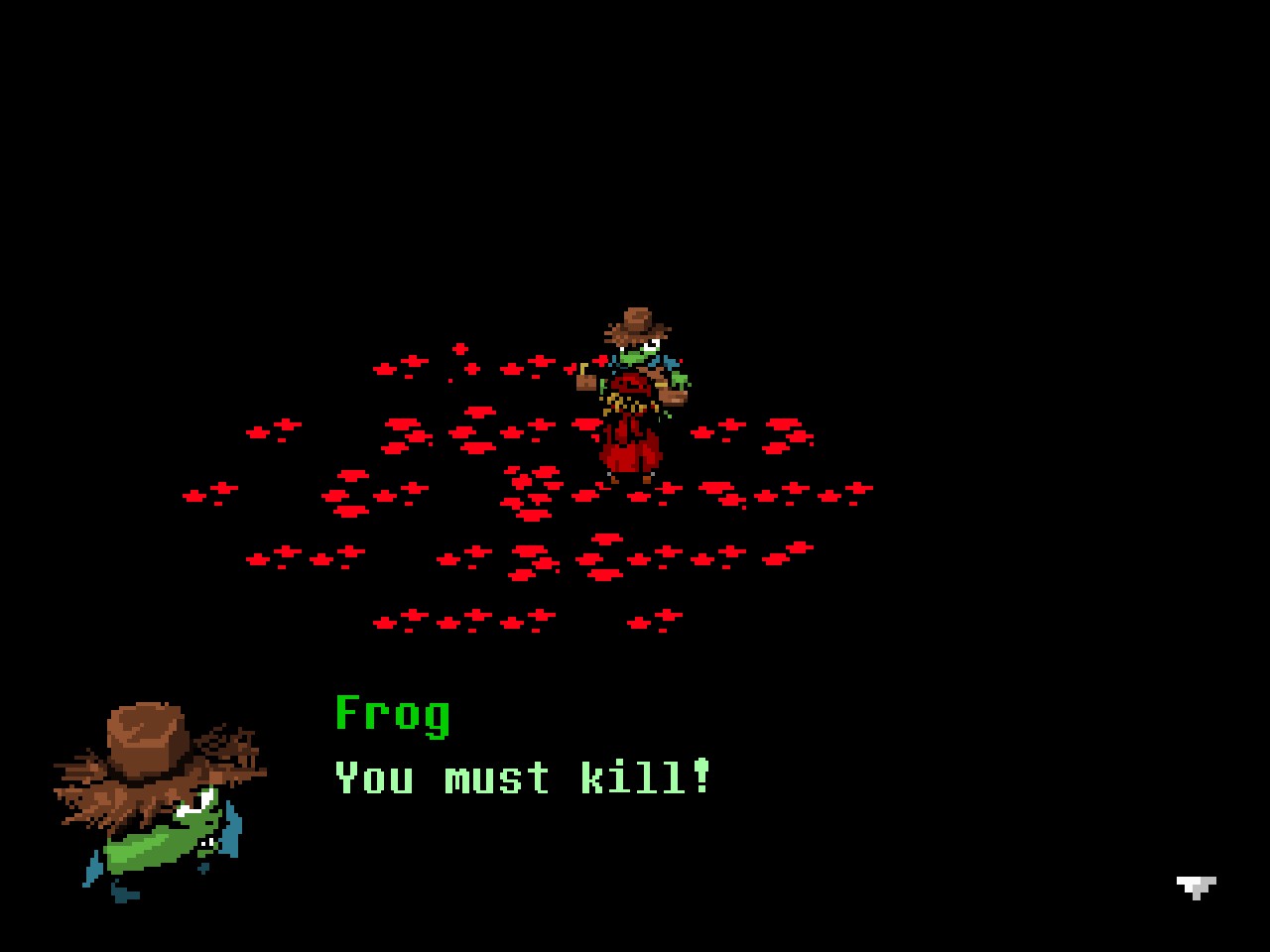
Okay, so, not a bad premise. It's a premise with legs for sure. (Ha ha, take that, Blue Gnome.)
I just wish it didn't feel like such a reaction to Undertale. Undertale billed itself the game where "no one has to die," and now Everhood responds by being a game where everyone has to die.
The problem here is that Undertale was already a reaction! It was a reaction to RPGs where killing is your only real means of interacting with the world. It appeared to maintain the typical RPG reward structure (use Attack to kill monsters -> gain levels for stronger Attacks -> repeat), but then made it far more rewarding in every non-material sense to engage the monsters as characters rather than stat checks.
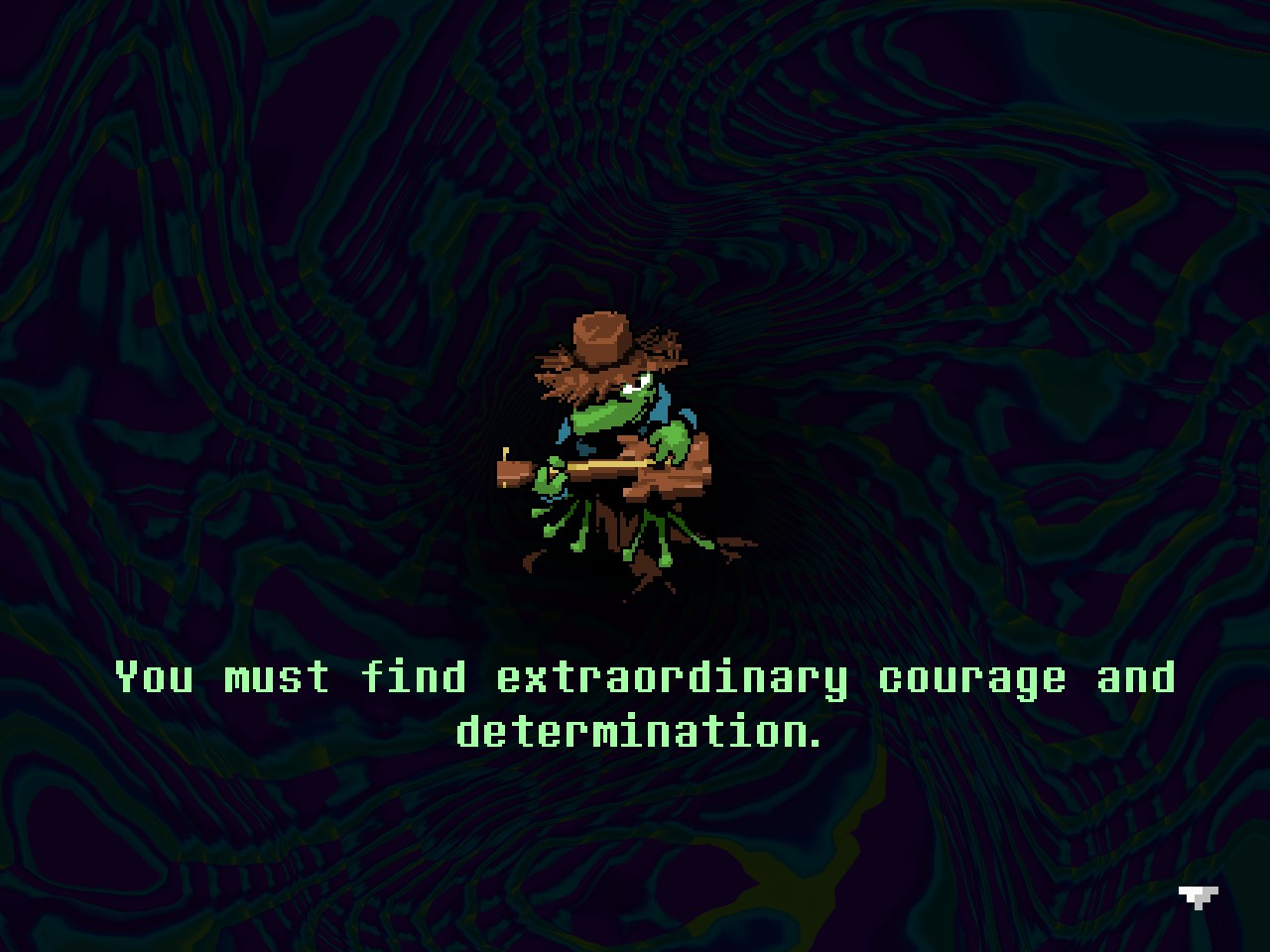
Undertale doesn't have a monopoly on alternative RPG combat systems or worlds filled with quirky monsters for you to either befriend or kill. But Undertale was really considerate about what it wanted to say about human nature, and that Everhood critically injures itself by inviting the comparison.
As you might expect, if you refuse the Frog's quest, they get pissed off and fight you, cursing you for refusing to end the world and "free the souls" trapped there. It's an excellent fight, with an amazing song. The Frog summons a halo of guitars, and as the song progresses through various musical styles, the Frog plays the appropriate guitar to fit the music. It's extremely well-done.
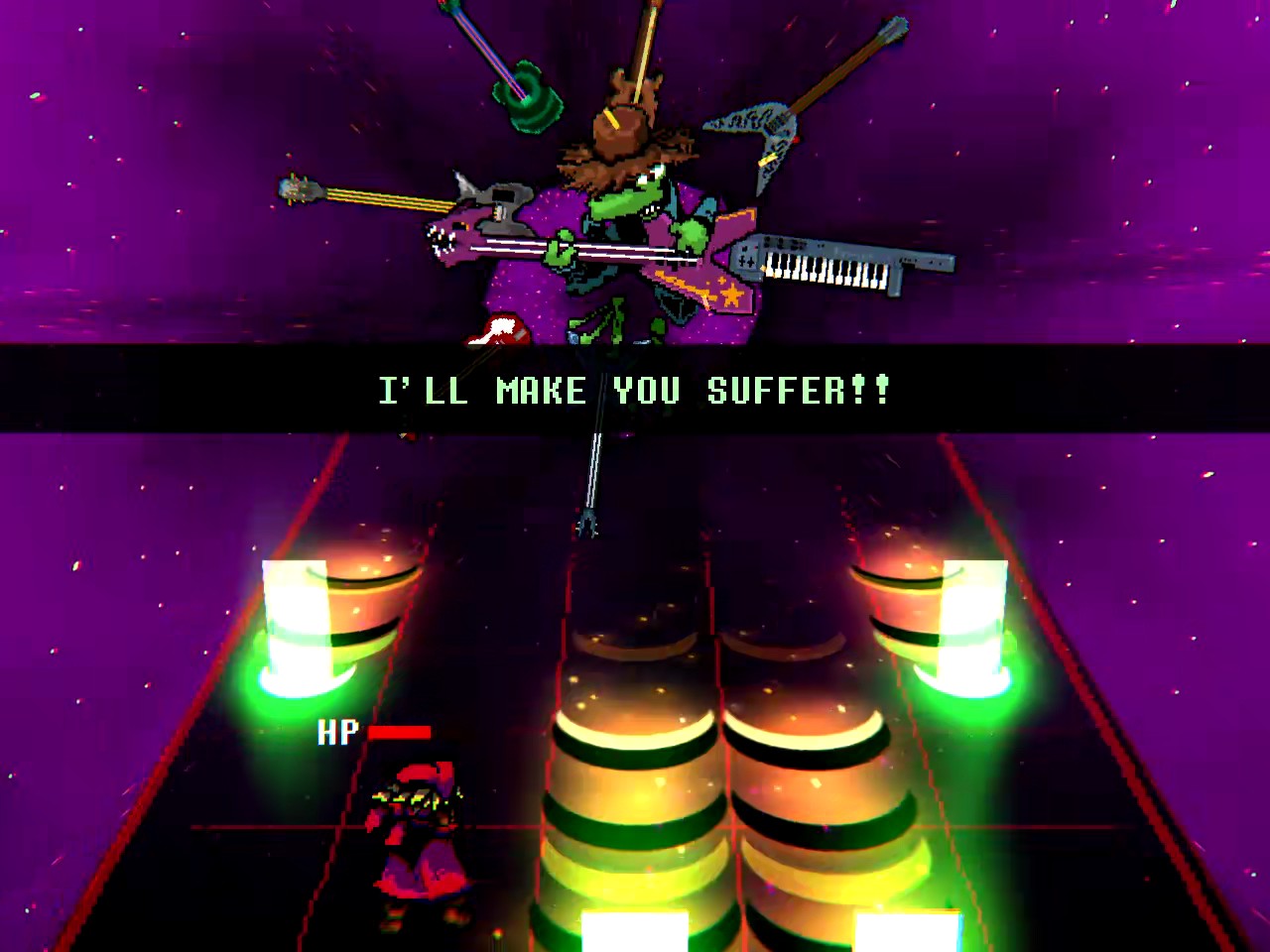
There's an incredible moment where the Frog swears, "I'LL FIGHT YOU FOR ALL ETERNITY!", which is only a little bit undercut when they give up less than a minute later. A minute is a long time in bullet hell time, but it's not quite "an eternity."
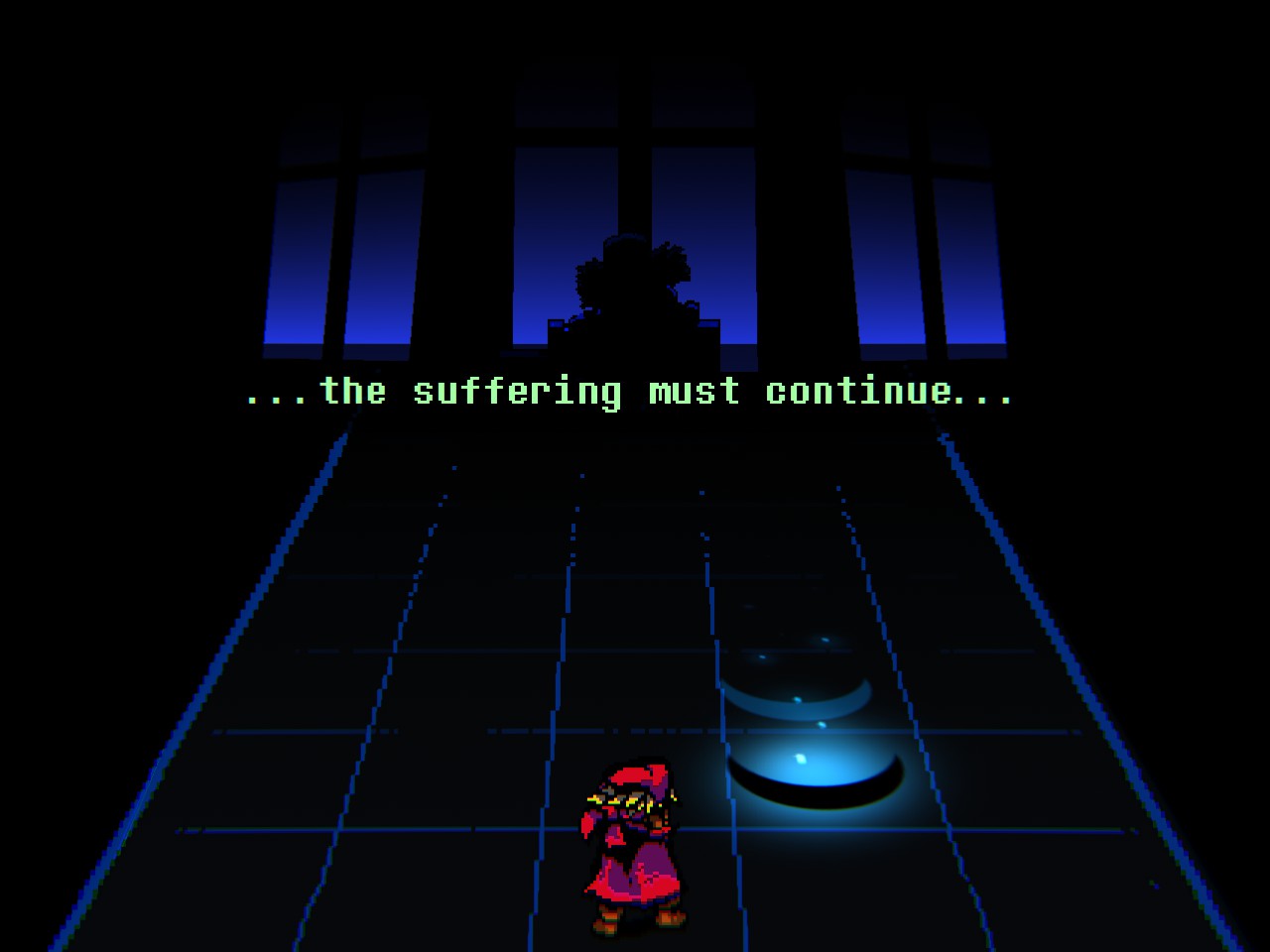
Yes, this is Everhood's version of the Sans fight. The harmless-seeming character who punishes/rewards you with an incredible battle if you deviate from the framework the game puts in front of you. It's the character who's far more aware than they let on, who pledges to fight you forever, who curses you for not doing what's right.
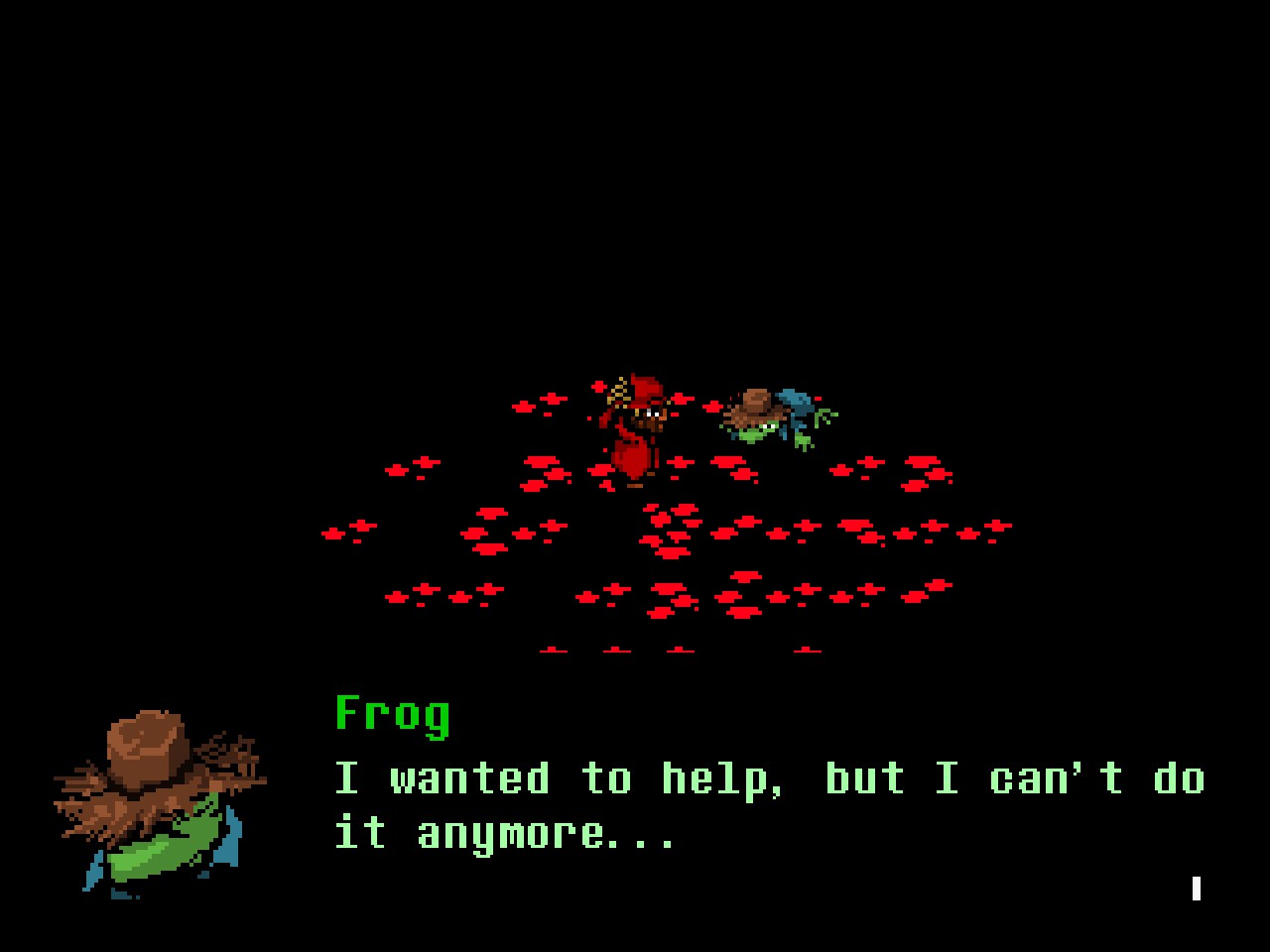
Except Sans actually makes sense. Sans is trying to protect his world by exhausting you, knowing that you can never truly be beaten. It's a critical moment for him: he's breaking the promise he made to a dear, departed friend he never even got to meet because of you. He's mourning her, his brother, his friends, his people. He knows that you could bring them all back, and that you might do so only to kill them all again. He knows that as soon as you feel like you've seen all there is to see, you'll murder the world itself. All he can do against your immortality and ability to rewrite history is drag you into a stalemate, denying you that final ending, hoping against hope that you might come to regret your choices and restore things to the way they were before.
Frog, in contrast, is... what's their goal, exactly? If they exhaust you, or succeed in "fighting you for all eternity," then everyone is still trapped in the realm. They're just unproductively trying to punish you. And it's harder to accept it as a punishment when Everhood was like this when you got here, versus the misery you inflict on Undertale's world during the Genocide route. It doesn't help the comparison with Undertale that Sans is a far more fleshed-out character, with established relationships to other characters, including you.
Frog just shows up at the start and midpoint of the game, never connecting to anything outside of themself. They call the other characters their friends, but Frog never interacts with anyone besides you. They don't mention any other character by name, and none of the other characters ever mention Frog. They are a non-entity to the rest of the cast.

I don't want to turn this into "Everhood isn't as good as Undertale, therefore it's Bad." But Everhood invites the comparison. Between the Flowey fight, the "Pacifist/Genocide" routes (but reversed!) and the degree to which Frog plays a Sans-like role, Everhood shoves its inspiration in your face.
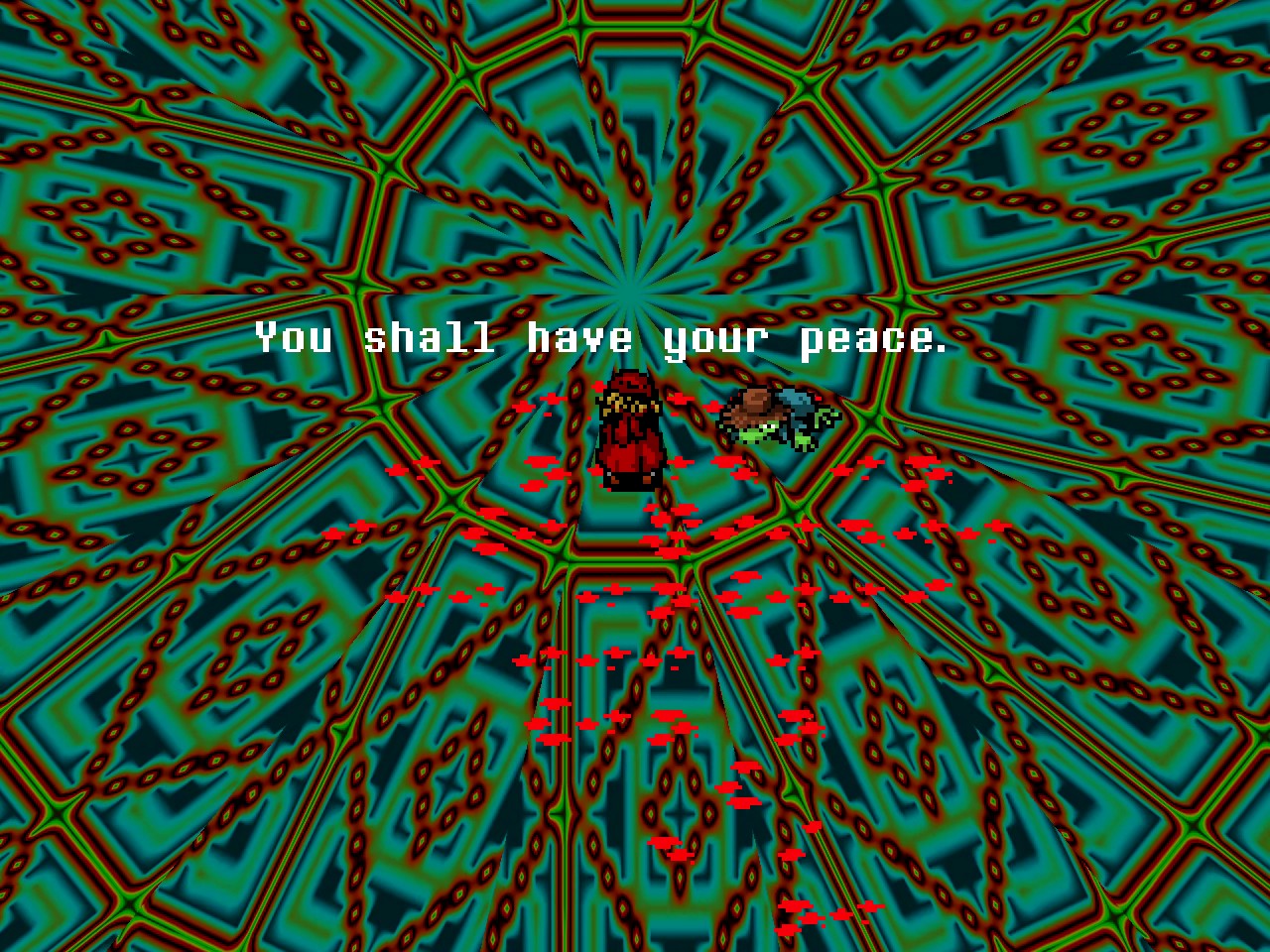
I understand that Everhood's setting is a decaying, dismal realm, and it does make the case that ending it would be for the best. It's not "killing" in a literal sense, right? Well, no, it is killing, in a literal sense. But everyone will probably be reincarnated, so it's okay to kill them! They do establish that. It's just that they fail to sell it in the way they need to.
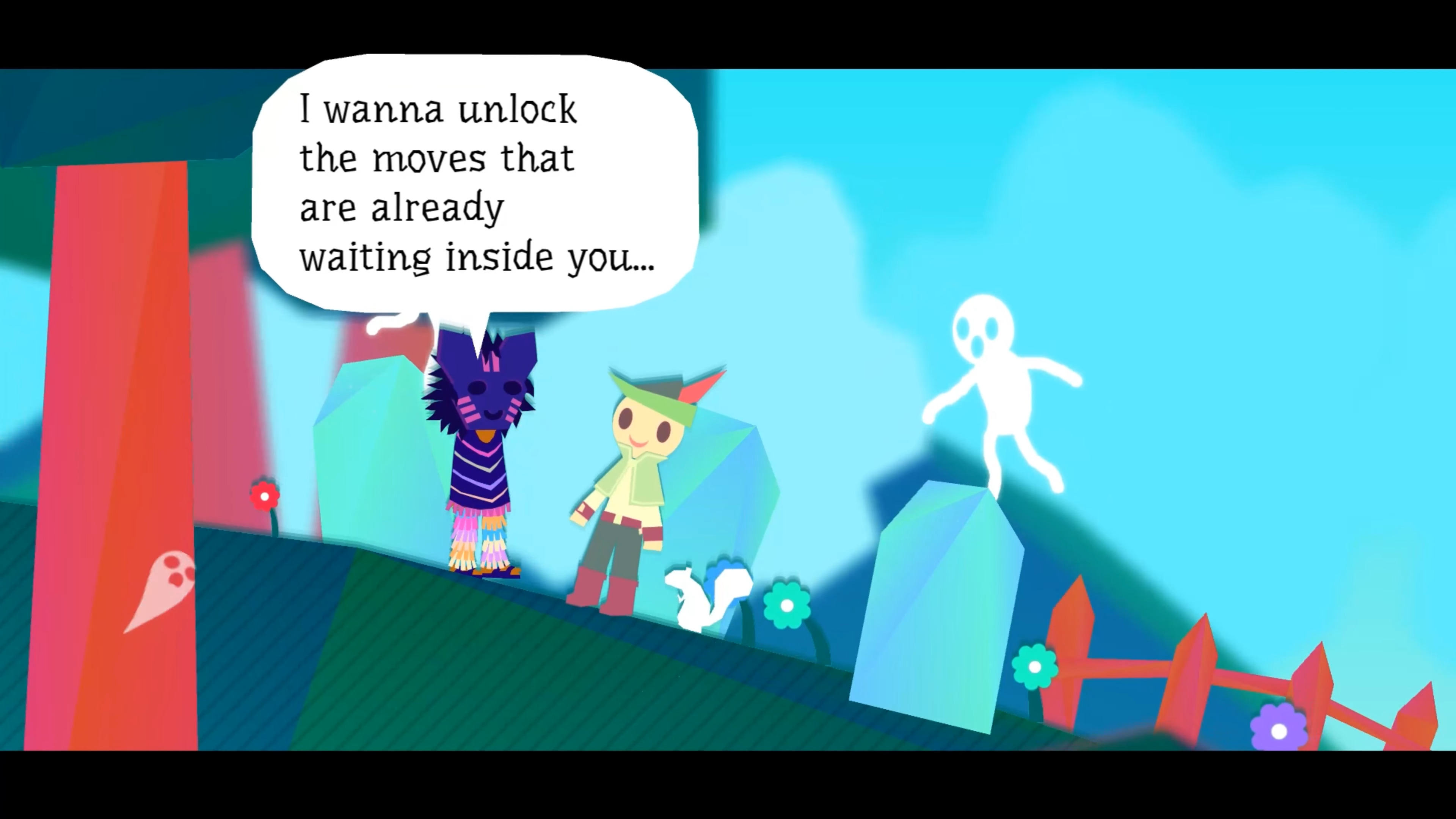
Frog's insisting that you Kill Everyone hinges on convincing you that everyone is Secretly Miserable and would be better off having their souls "released." That's a fine motivation, except that nearly all the characters seem like they're having a great time! They're racing go-karts, exploring creepy castles, playing RPGs, having fun at dance clubs, running successful plank rental services, all sorts of things. Are these things supposed to lack the "meaning" and "purpose" that Frog mentions in their "time to kill everyone" speech? Are we supposed to see a world where characters explore, play and dance with their friends, and feel disgusted by their pitiful existence?
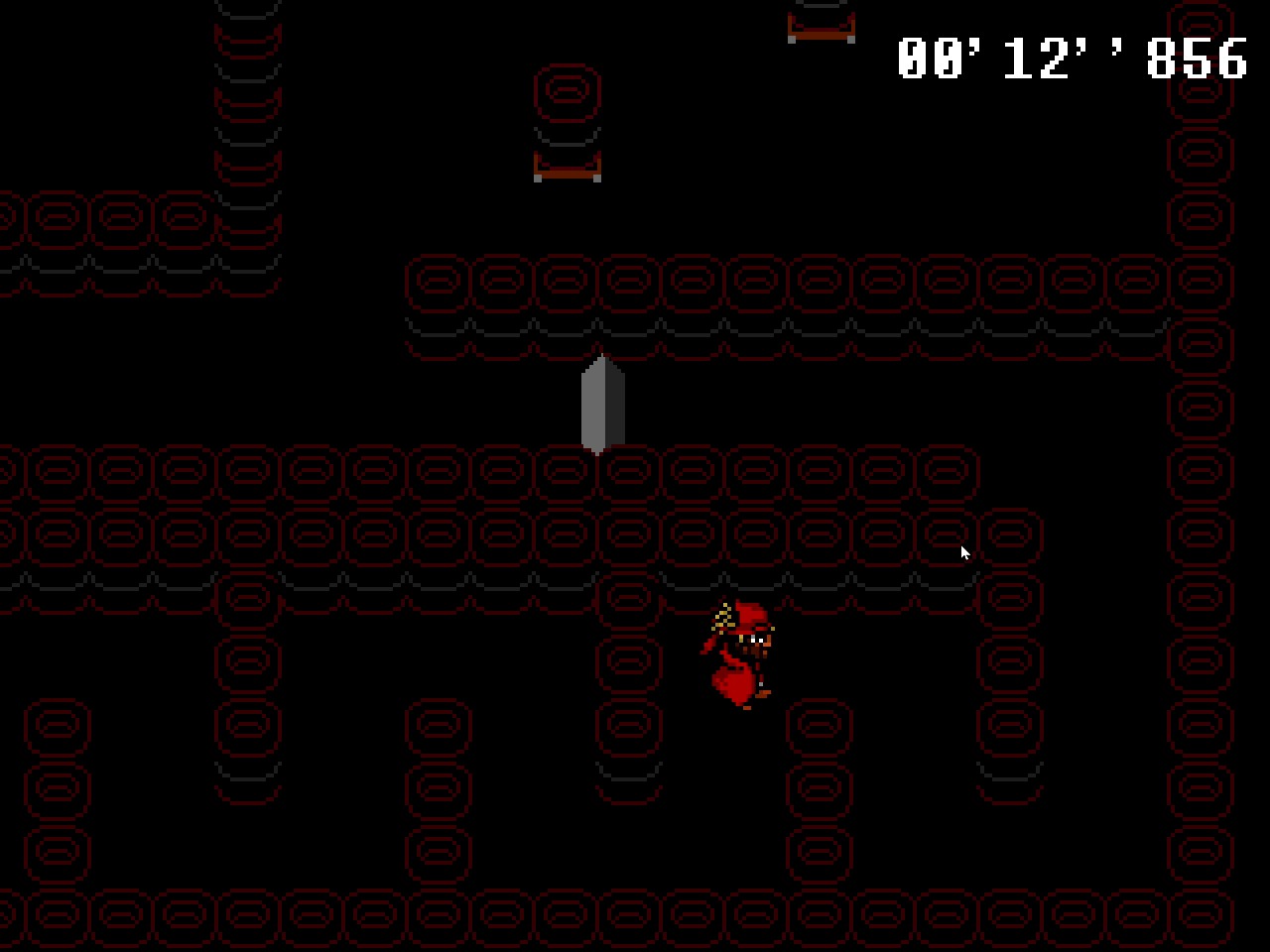
The one place where they almost sell it is in a reveal that Green Mage lost their eye on purpose, due to the boredom of existence. That sucks! Maybe death is appropriate for Green Mage, if the only thing they have for entertainment in their life is crawling around a swamp, blind and helpless.
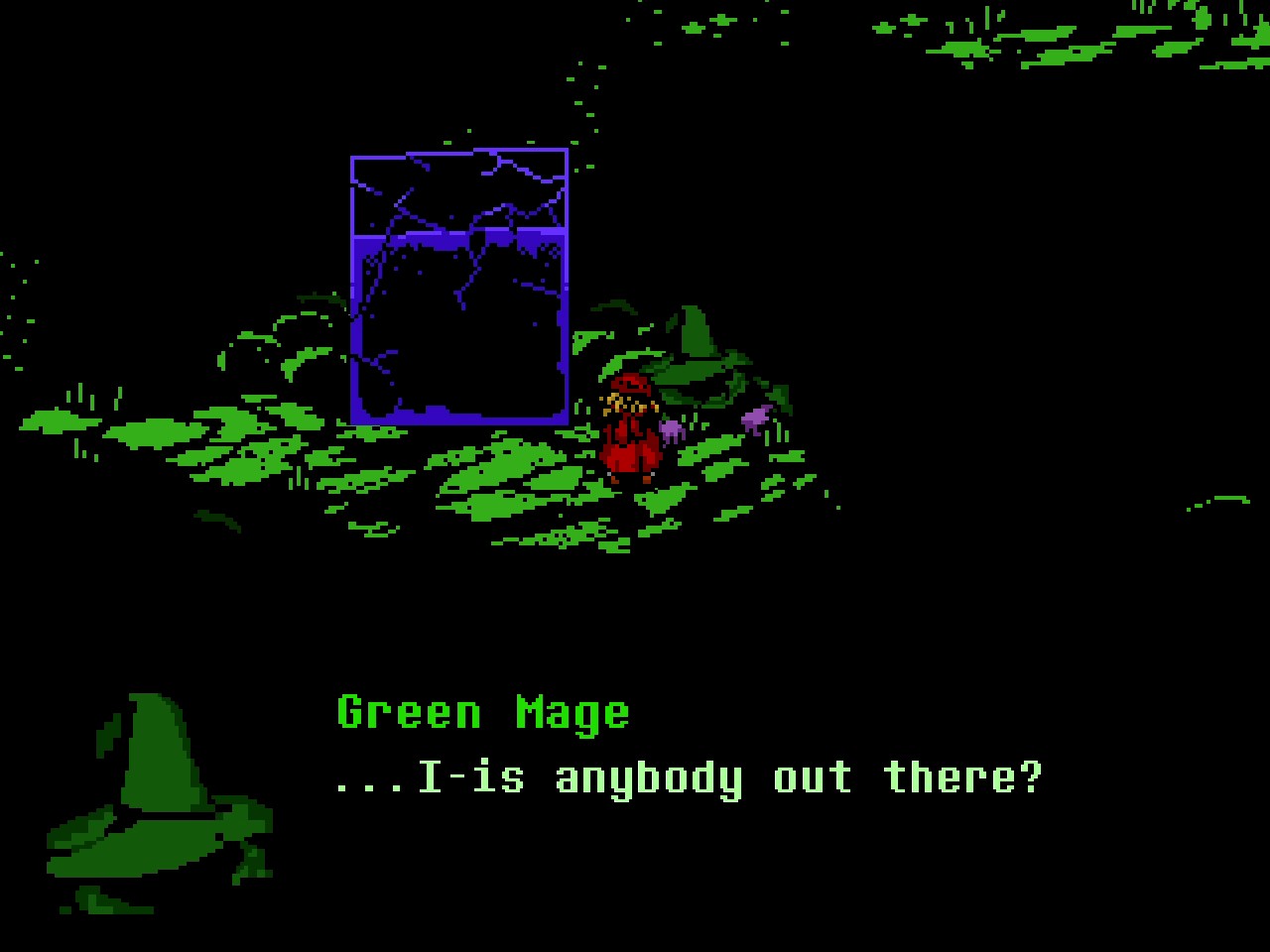
But this doesn't work when they're also hosting fun and exciting roleplaying games with their friends on a regular basis!!
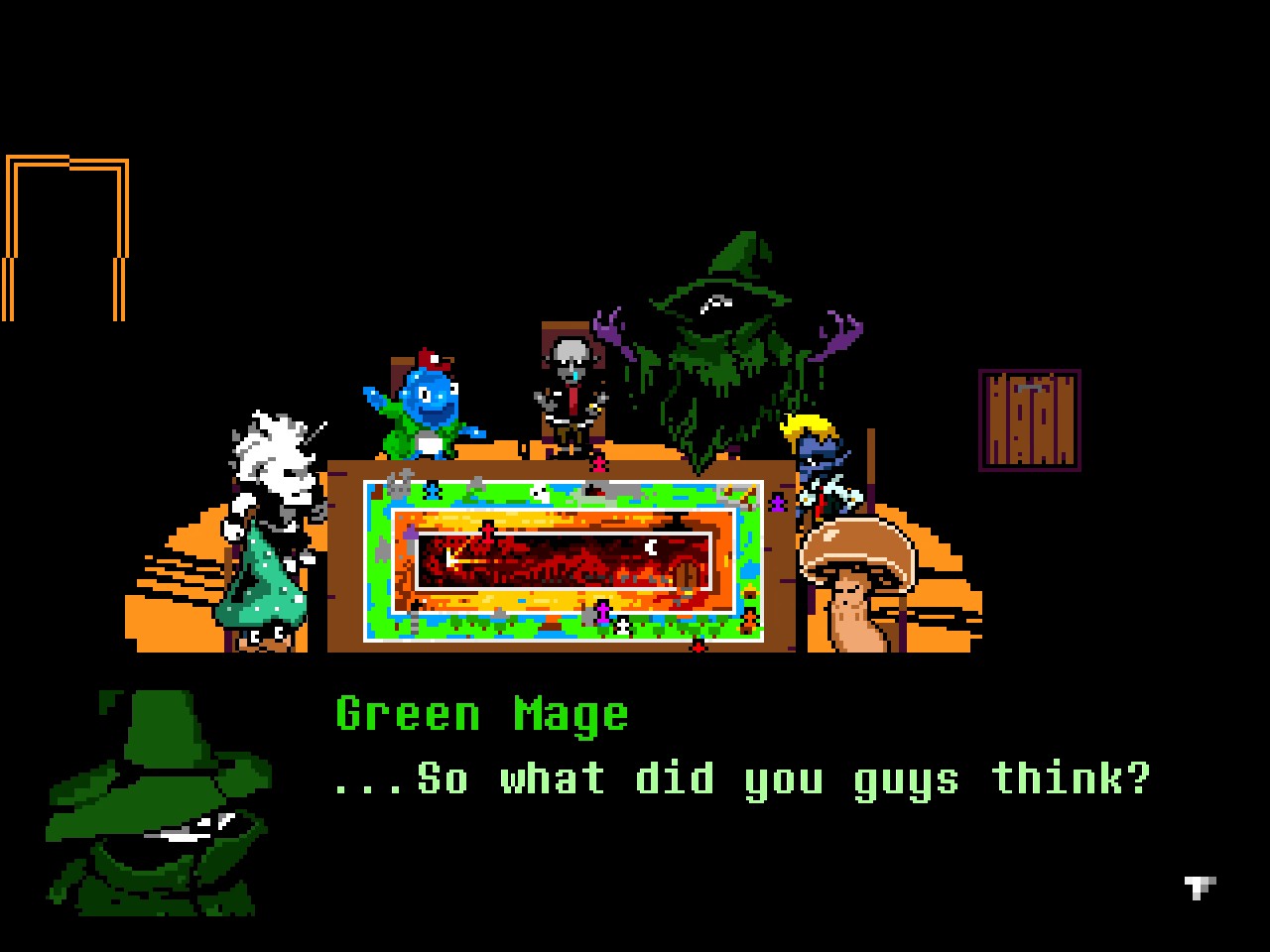
Here's how I'd rewrite this: have the Medallion game go the same way. Then, at the end, when Green Mage asks how everyone enjoyed it, have Muck say something like, "That story was great! Just like every other time!" Then Green Mage can be surprised that they've run it before, and Muck can blithely reveal that it's the only story they ever run. Green Mage's horror of realizing they're stuck in a loop and unable to even remember it? That would be a reason to consider ending their existence.
Then you could have Green Mage remember that spending ages blindly crawling through a swamp is something they chose for themself because they were so desperate for anything besides the loop, and now they've fallen right back into it. That would be a situation where it might feel like not taking action isn't acceptable: where you can't just leave Green Mage to rot, even if the only other alternative is to take their life.


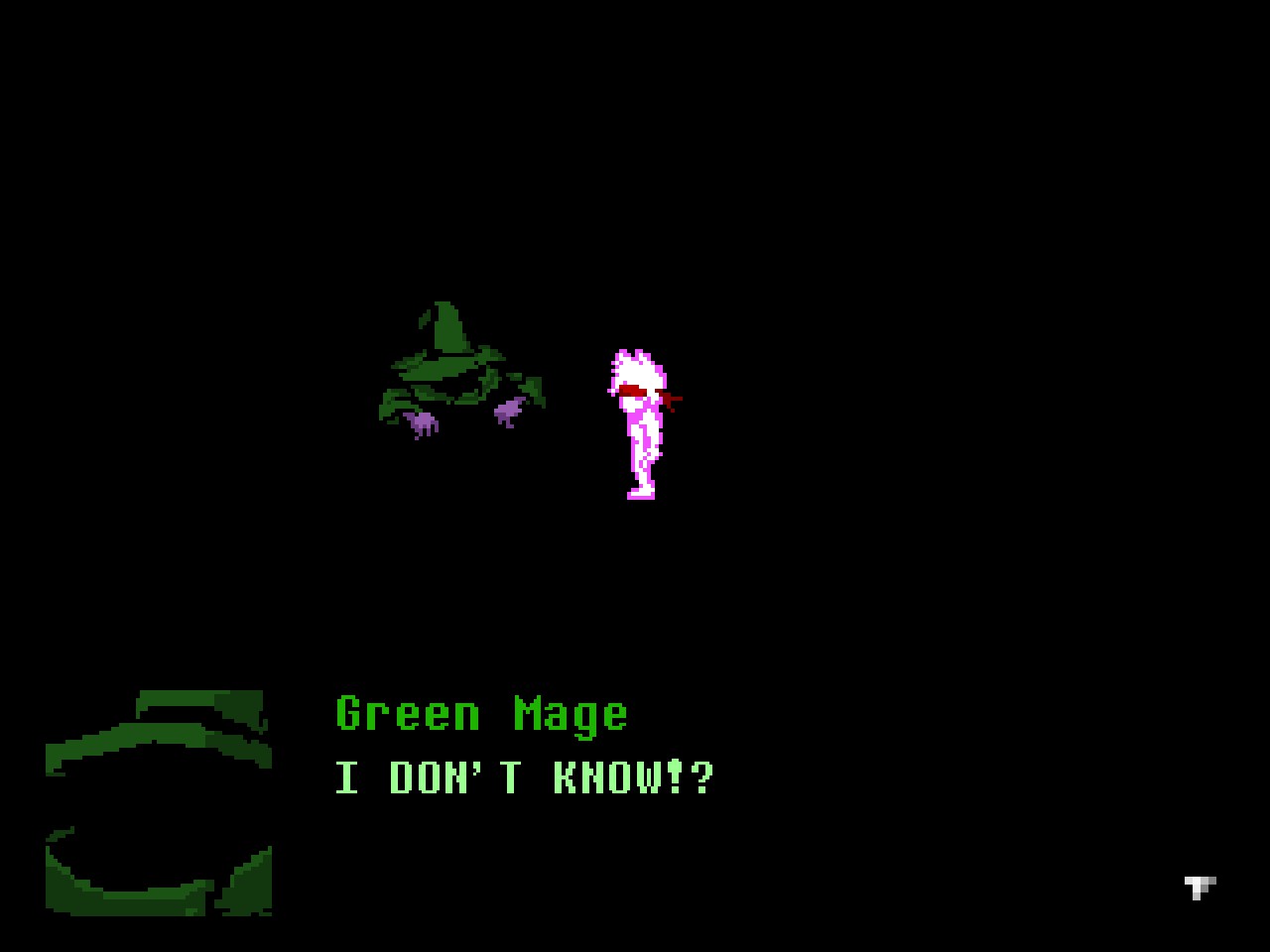
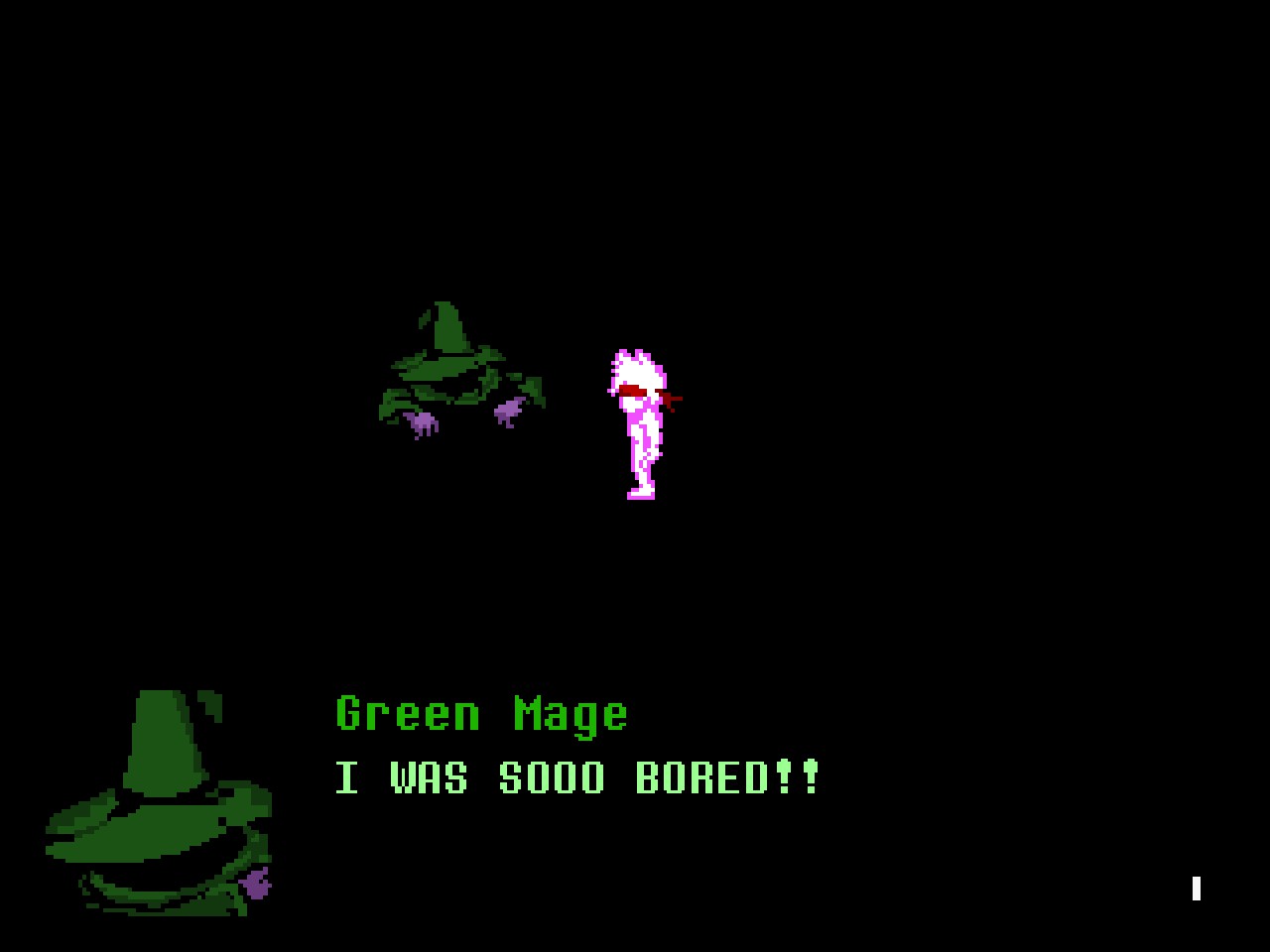
It's worth noting the Medallion sequence is the only portion of Act 1 where you can fight back, by giving you a parry move that can send red notes back at your opponent. What if instead of that just being a neat gameplay gimmick, it was revealed to be Green Mage's subconscious desire to have you kill them, even as they can't consciously process that?
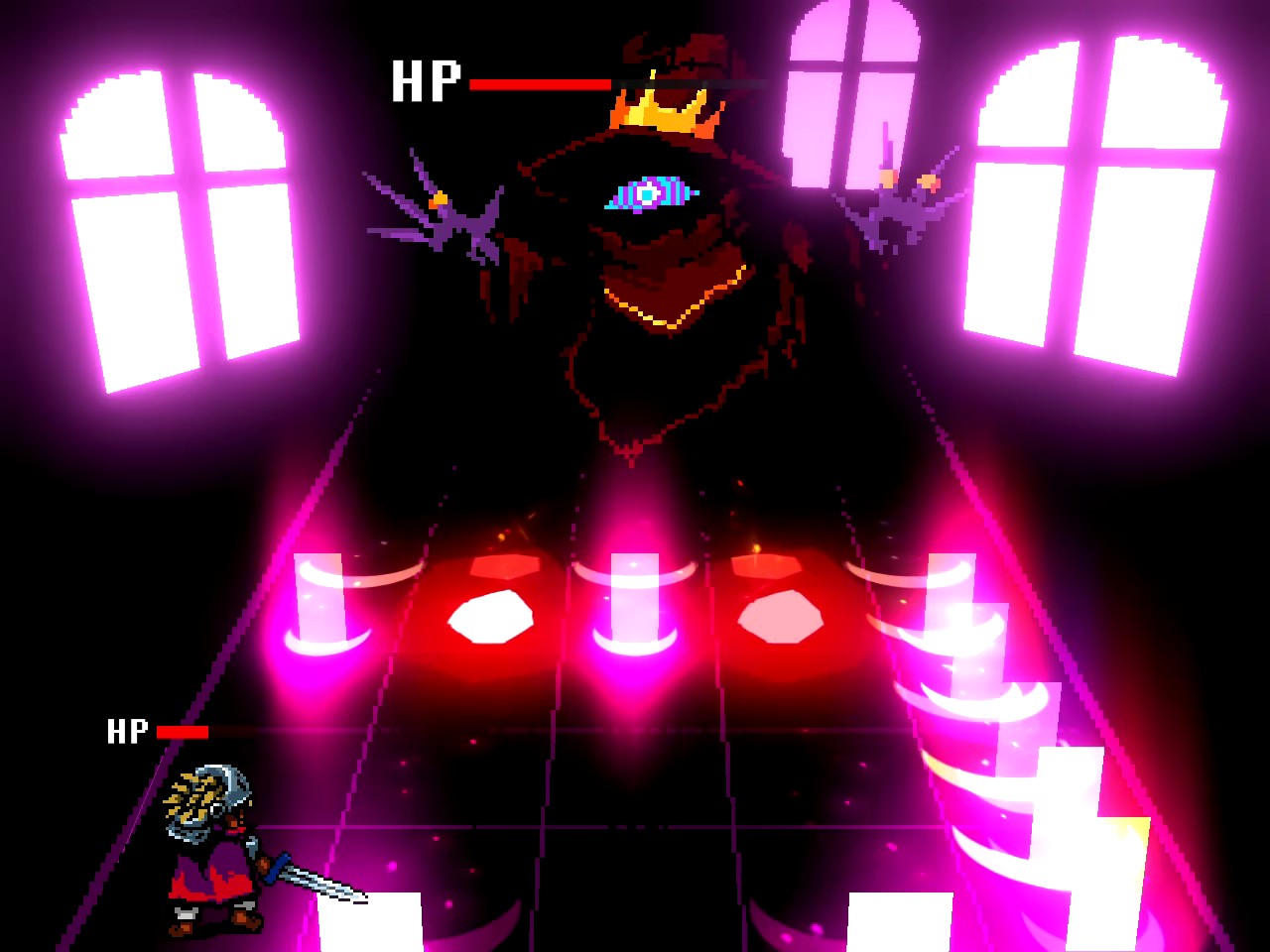
Hard to say. It doesn't feel like it's Everhood's style to not mention it at all, if that was the intent.
(As an aside: Defeating Frog doesn't actually end the game. After Frog is whisked to the afterlife by the narrator, you're told that you can return whenever you want to finish the mission Frog gave you. Defying Frog and asserting your moral authority to not be pressured into murder is a zero-commitment decision that the game doesn't take seriously. You've had your fun, now get back on the railroad, chump.)
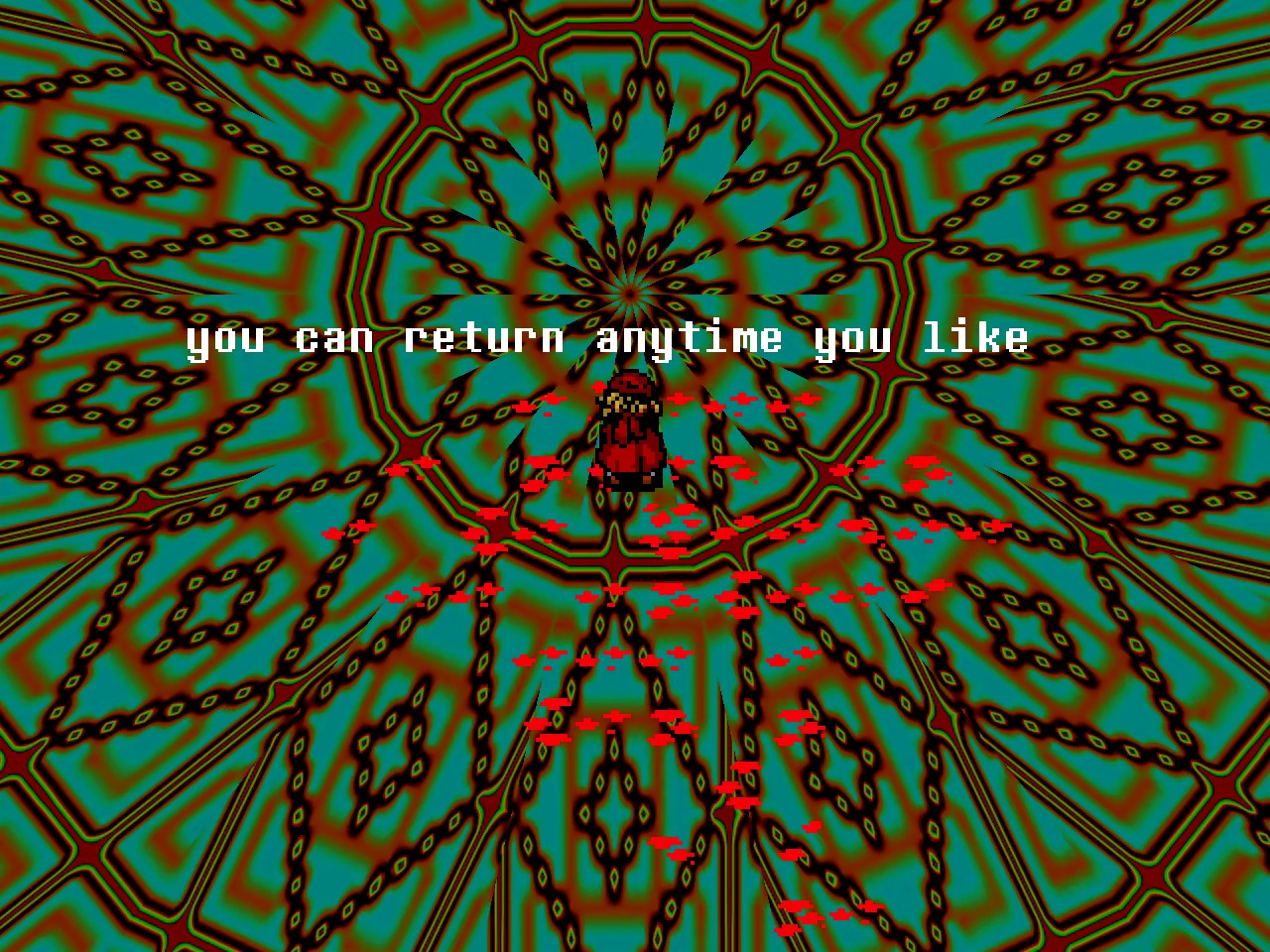
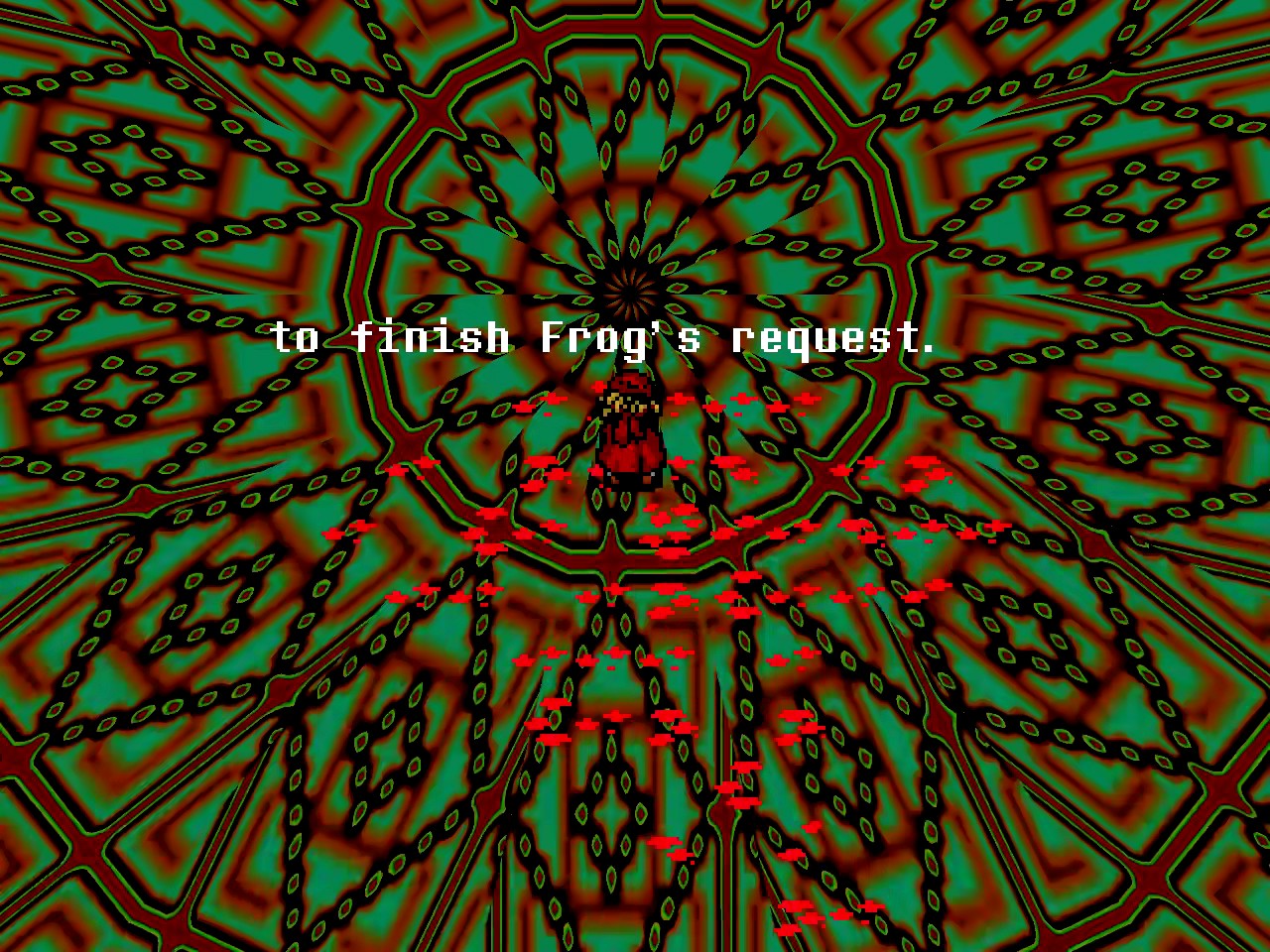
Moving along.
There's some dialogue suggesting the rot of the world is due to Gold Pig's hoarding of wealth, but... why? No one uses money. Zigg blames you for spilling their outrageously expensive drink, but money never comes up again. What does Gold Pig's stockpile of gold bars have to do with the world decaying? No one lives in poverty. No one's needs aren't being met.
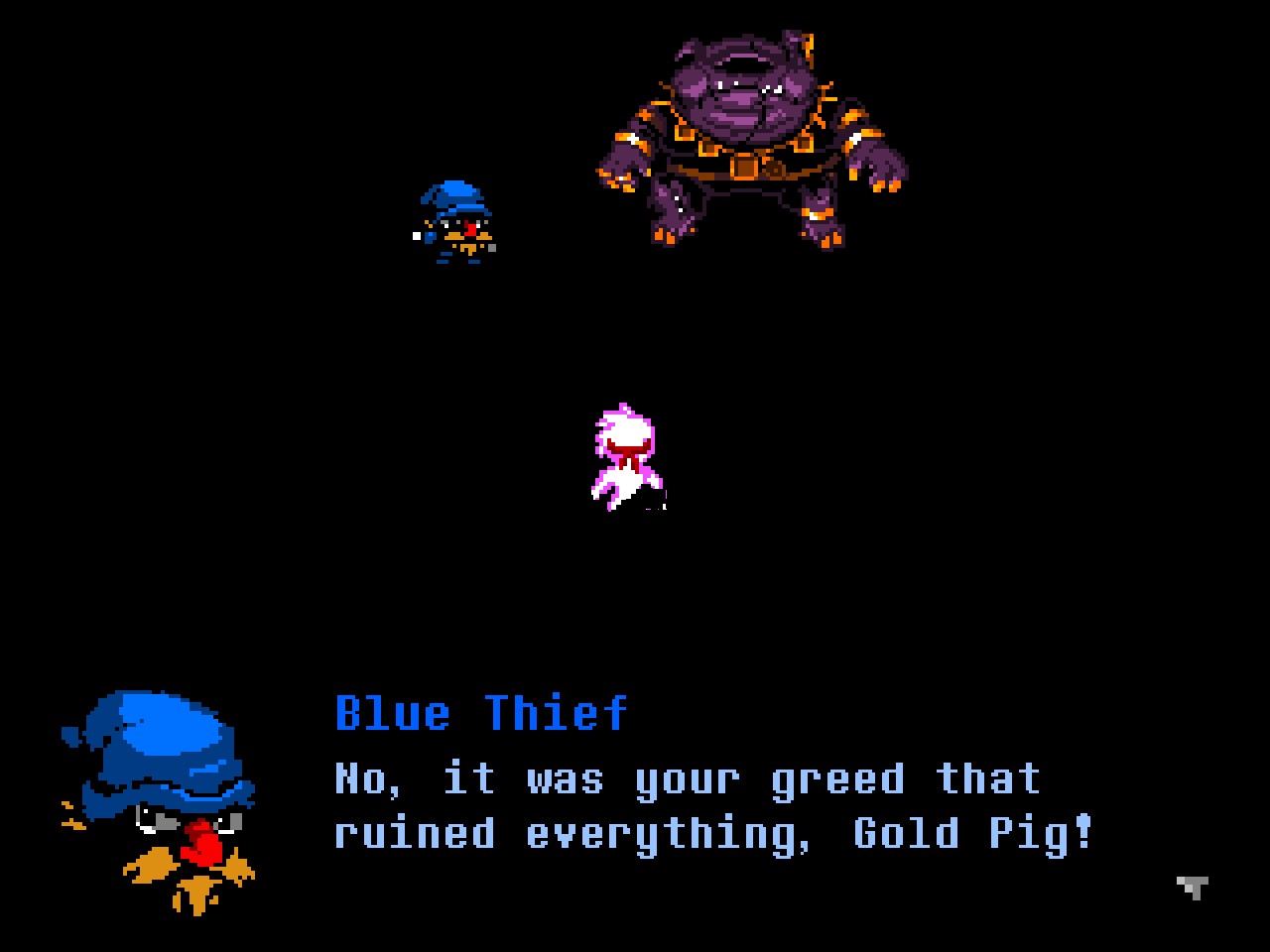
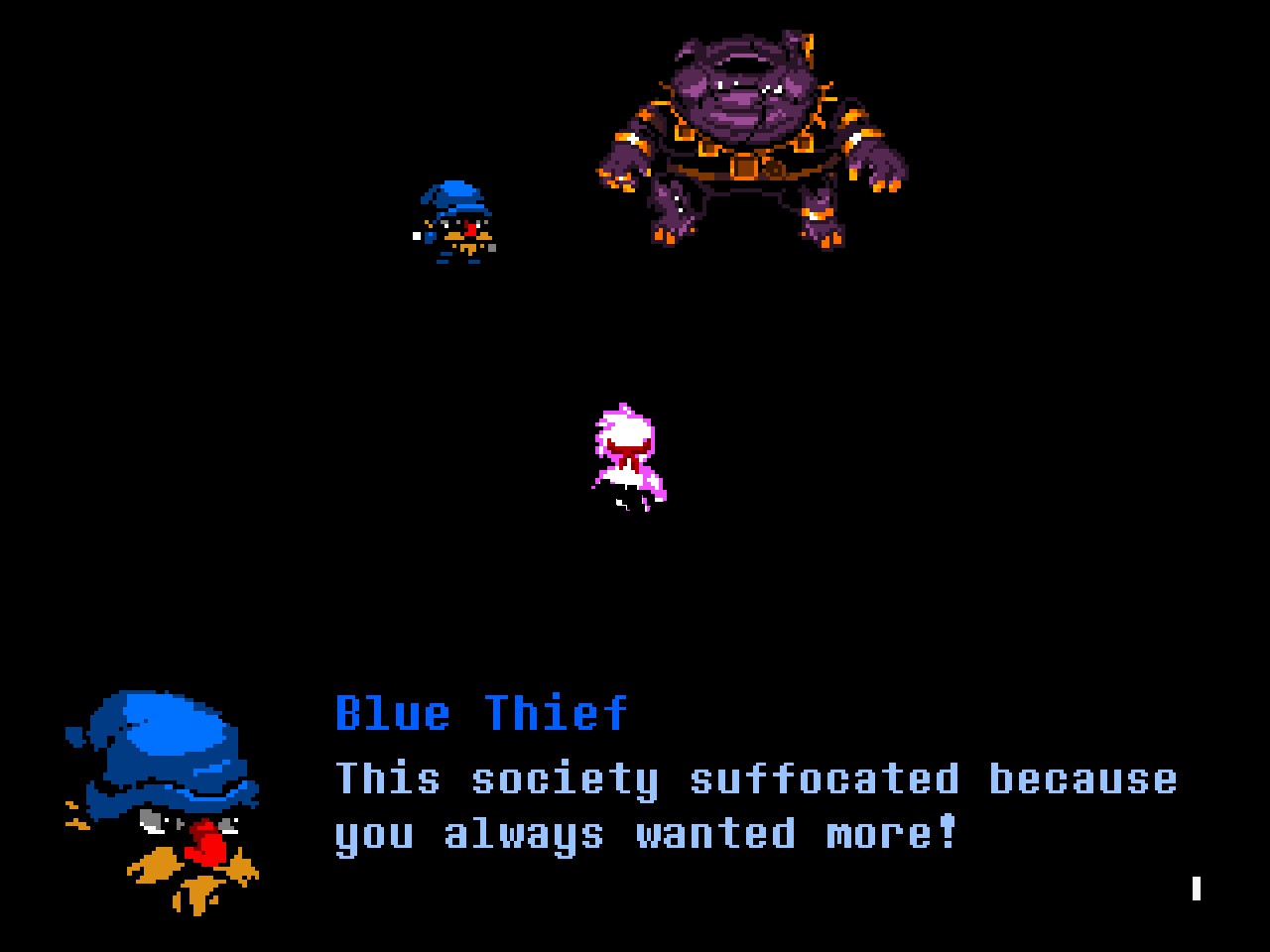
You tell them, Blue Thief! Hey, wait, if Gold Pig was ruining everything and suffocating society, you must have had a really powerful motive to work for them! So what was it?
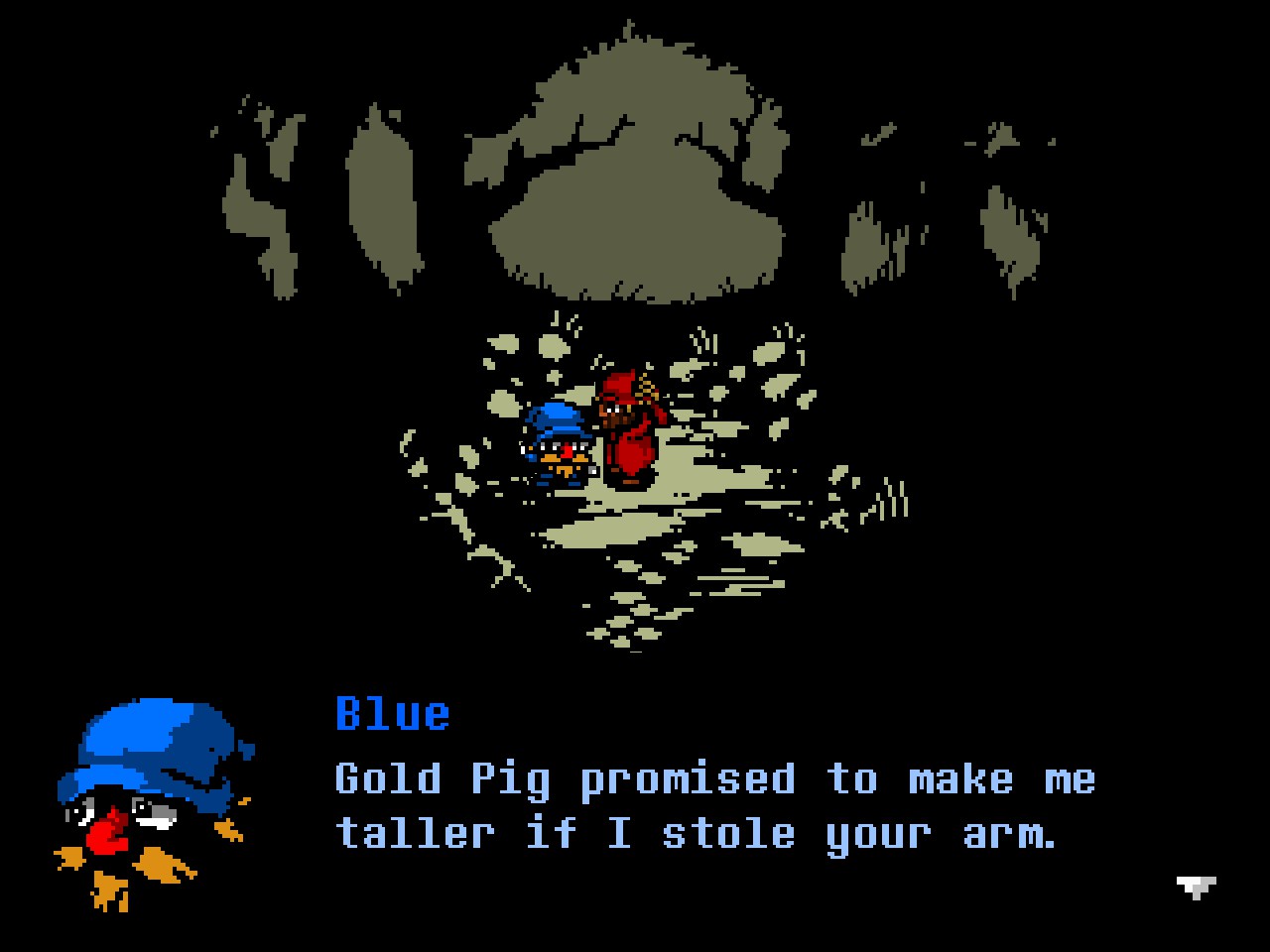
And if Gold Pig is slowly ruining the world, why doesn't anyone try to stop them, or seem to care? Green Mage and Purple Mage may be in Gold Pig's service, but when they openly chide Gold Pig about their greed, it feels light-hearted. They seem amused by how Gold Pig's greed leads them to act in short-sighted ways, rather than mourning the slow death of their world brought about by Gold Pig's avarice.
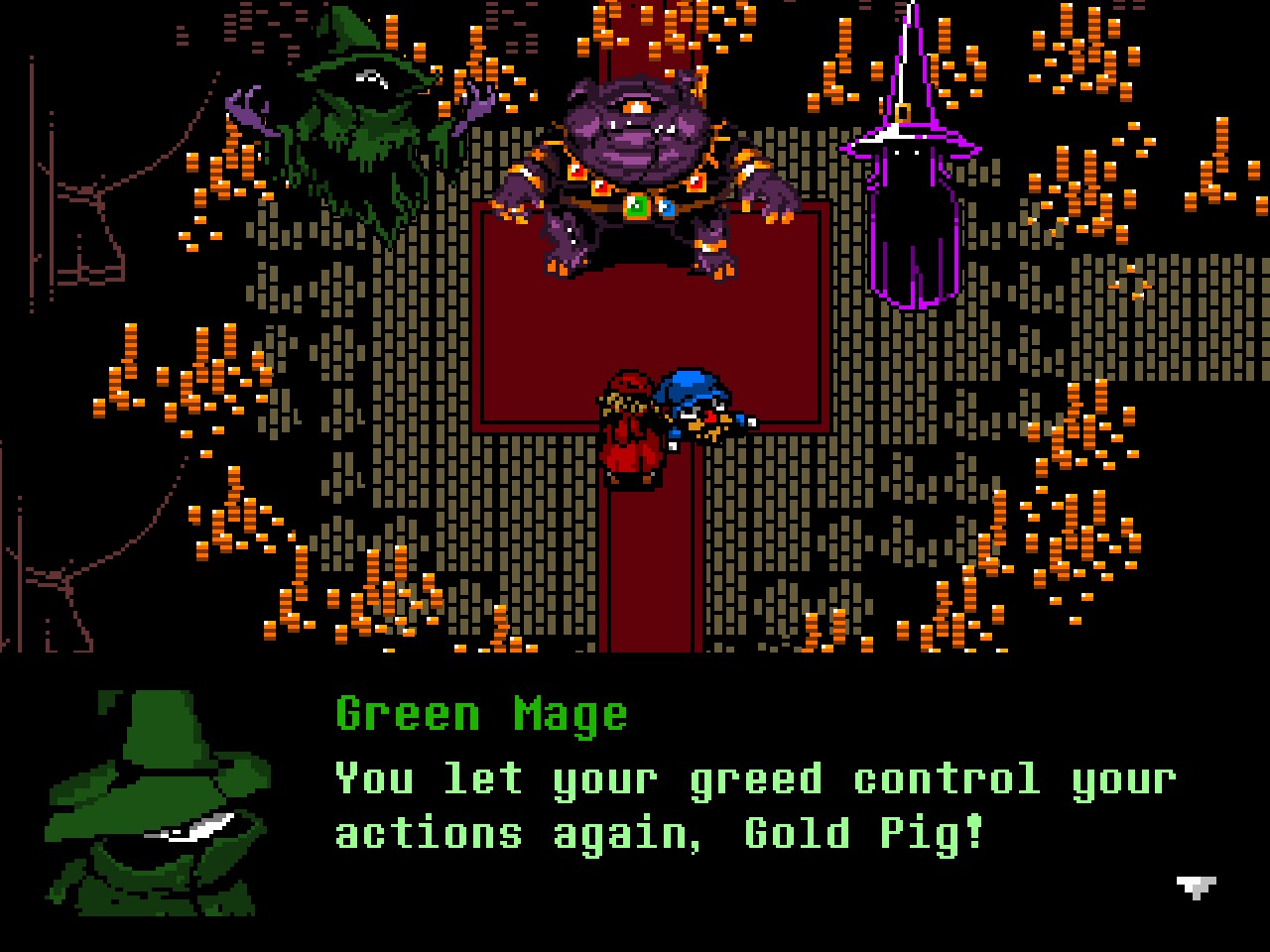
Like, come on, devs. You gave everyone they/them pronouns. Don't tell me you were afraid to put an anti-capitalist message in your game.
Here's an idea about how to improve this: what about linking it to the movie theater that only plays static? It's not used for anything besides a general Isn't This World Weird? moment. What if we learned the movie theater used to play actual movies, until Gold Pig dismantled its antenna just to hoard the metal in their treasury? There, now you have another anchor for "The world is getting ever worse, and Gold Pig is at the heart of the rot."

I feel like Everhood has some really obvious emotional hooks in its setting: a stagnant world that can only get worse, surely but steadily. And it just didn't seize that opportunity.
What about a shot of an endless field of broken doors? What about a glimpse of a verdant and complete realm, to contrast with the current sparse and rambling areas you explore? You can't just say that Murder is the Moral Option and be done with it; you need to work really hard if you want to sell that.
Again, it's not a total failure of a message. The atmosphere of the game is unsettling throughout, and I don't think it would take much to convince me "this is a world that calls for its own destruction." I think there is a really powerful throughline in an idea the game almost lands on: that escaping from a decaying, abusive situation can feel like death, but is the only way to move forward.
I think if the game had really leaned in on what you were doing feeling like death and tried to work in that message through the game -- lots of little examples of the fear involved in escaping bad situations, how people can blind themselves to their own pain, how abuse contorts your memories and robs you of your feelings, what it's like to resign yourself to simply trudging forward -- then Everhood could've been a masterpiece.
Instead, what I felt like I got was... "what kind of sick bastard are you, you disgusting pacifist. how could you be so cruel as to not murder a bunch of people who seem to be Doin' Fine."
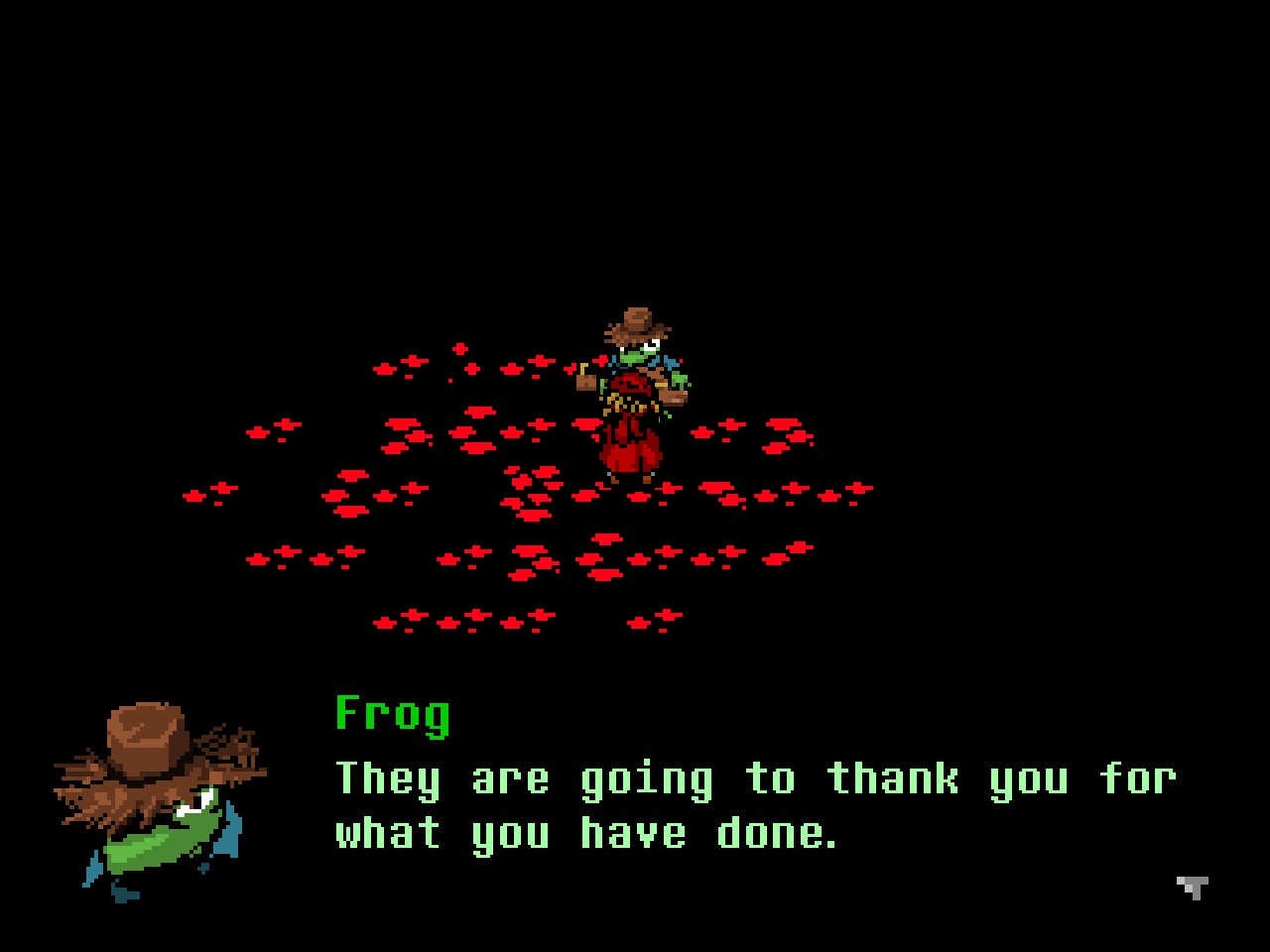
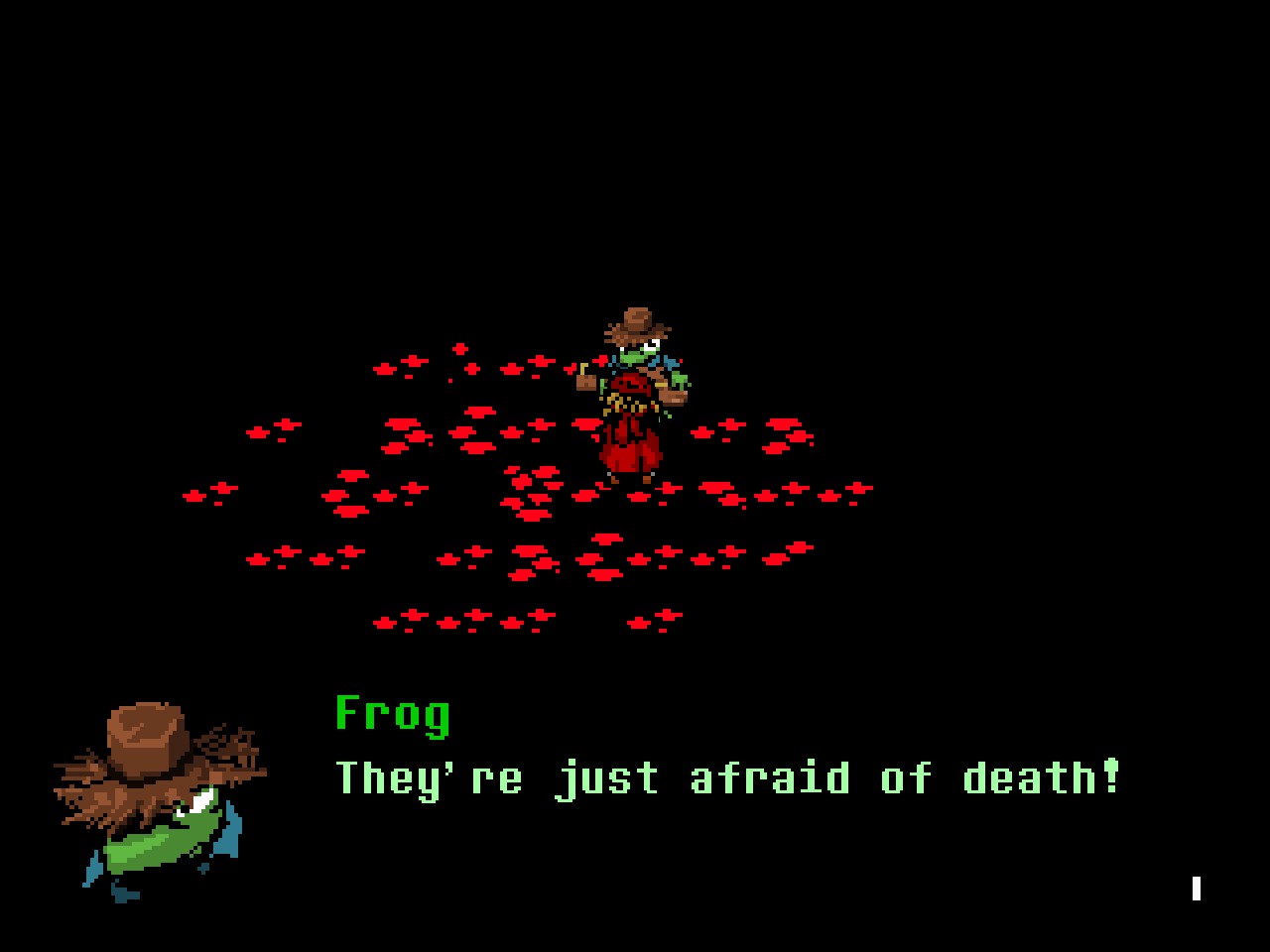
Okay. Fine. I will do murders, Everhood. I will indulge your framework.
To be fair, the Murder Everyone part works well, ignoring the problems with the larger moral framework. With each character you interact with, you get a choice to either talk to them or kill them. Choosing "Kill" starts a battle... sometimes. Sometimes you simply kill them while they offer no resistance. It's tense and painful every time. Sometimes you get a new battle to reflect the changed circumstances, and sometimes you just get the same battle you already had against them. It is horrible to have to slowly kill someone who doesn't even necessarily realize you're doing so, as if this were just another fun sparring match like the ones you shared in the past.
Killing Rasta Beast? Killing Rasta Beast sucks. It sucks so hard. Rasta Beast is the one character who starts a fight with you, rather than passively standing by and waiting for you to choose "Kill." It sucks!! In a good way!! Having to kill Rasta Beast was definitely the emotional low point of Act 2 for me. Their death felt like a loss more than any other.
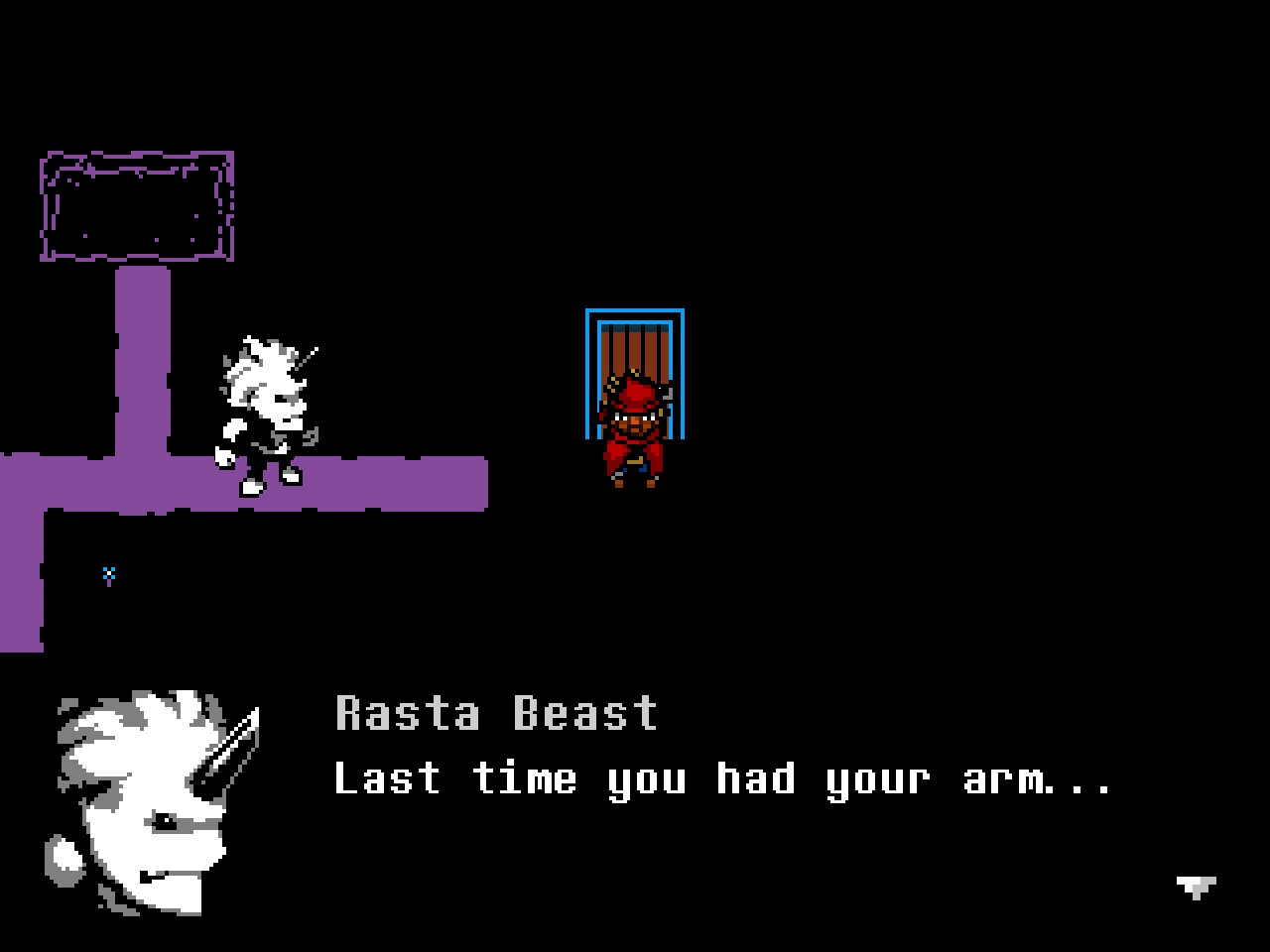
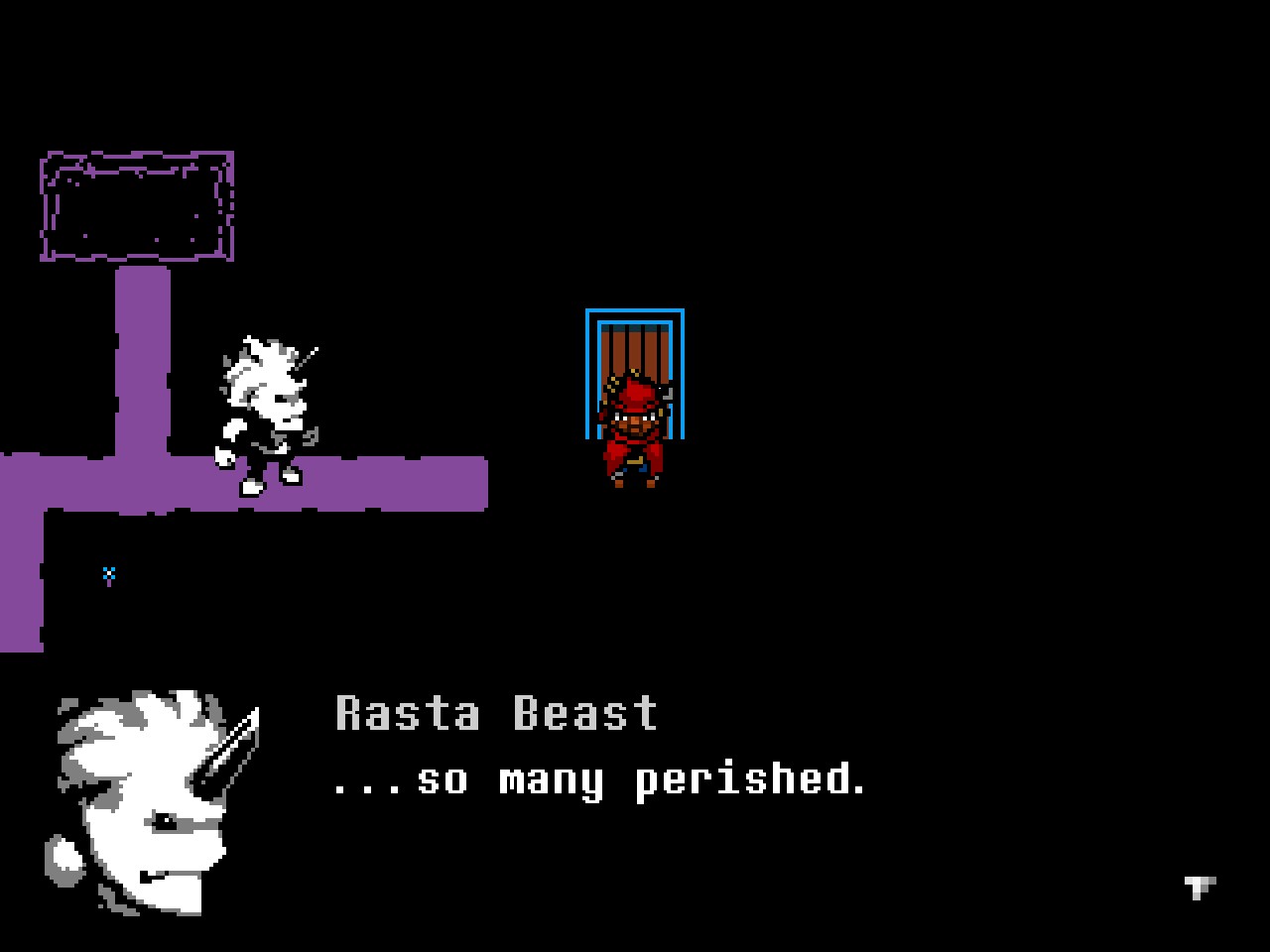
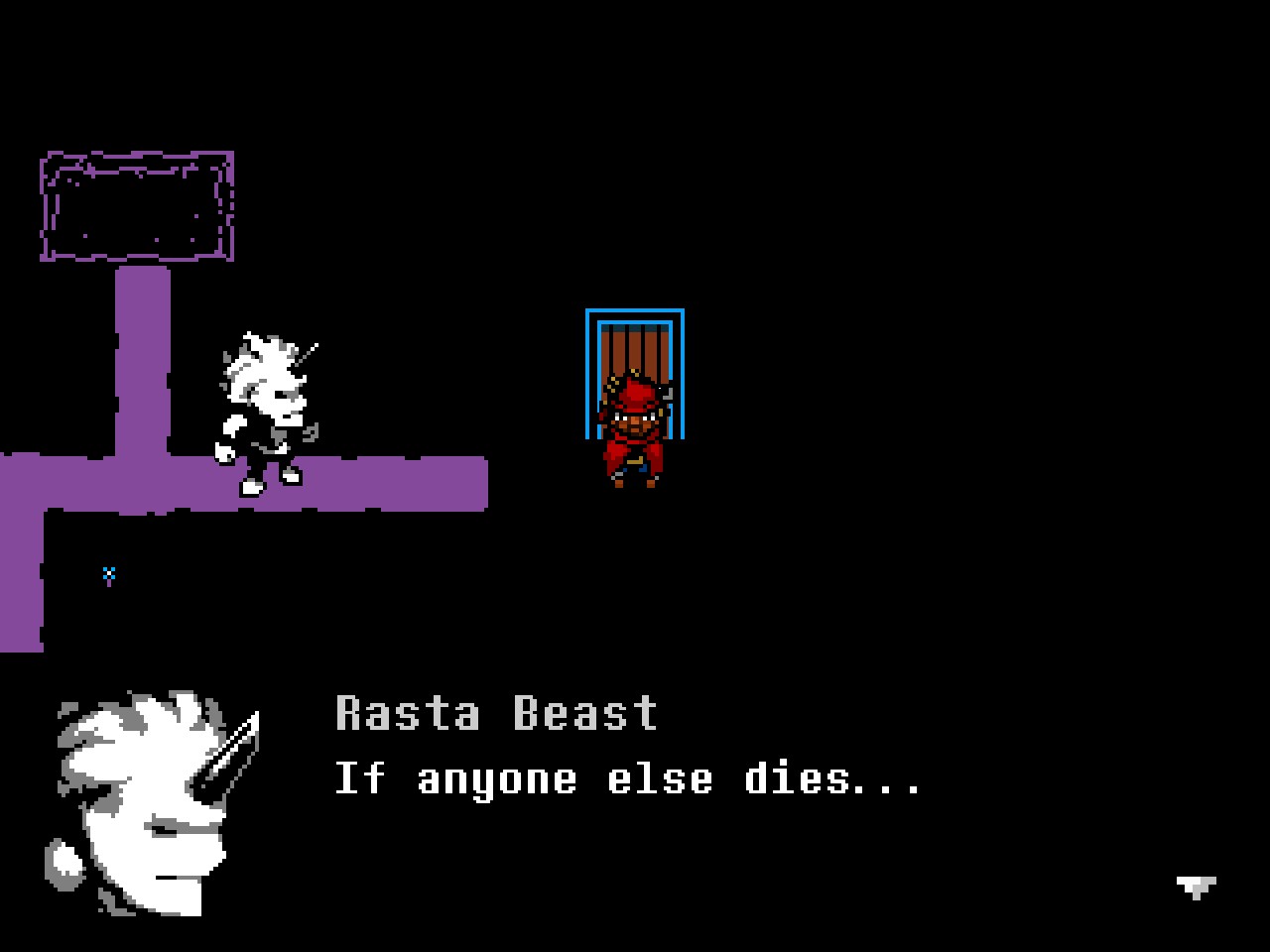
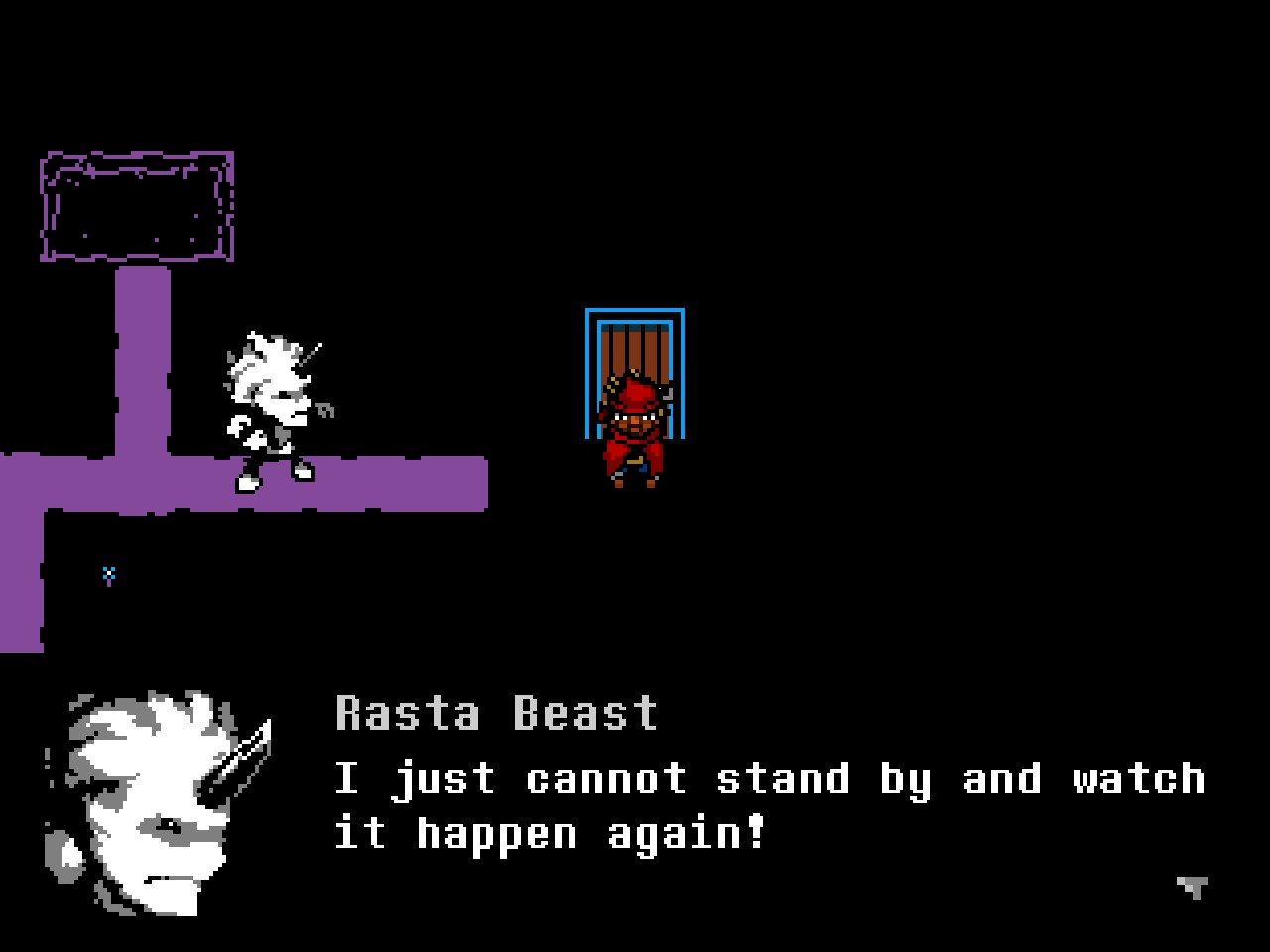
Another well-executed aspect: Red never speaks (aside from their reflection speaking to them through the Mirror of Truth), but throughout the majority of Act 1, you have Blue Thief to speak for you. Once you've beaten Gold Pig, however, Blue Thief gets their legs back, and no longer accompanies you. So for all of Act 2, you have no voice, no companion, just one silent murder after another. It's a far more lonely and hollow experience, and, yes, bravo, credit where it is due.
And yeah, it does feel bad to feel like you are slowly limiting your points of interaction with the world, little-by-little. Even if you're doing the right thing, it's hard. Closing time, folks. Everyone move on.
As badly as I feel that Everhood flubbed the feelings behind why you're going around killing everyone, at least the moment-to-moment execution of having to do so works well. It falls far short of Undertale, given how dynamically Undertale responds to your actions... versus Everhood, where each kill is an entirely independent event, unaffected by every other. Still, there are some real feelings in depopulating the world, and Everhood deserves credit there.

It works well... with one exception.
Remember Harrowed Haley, the tortured, withered victim in Professor Orange's Lab? The one suffering from unending pain and wracked by terror? The one character that you might think it would be appropriate to kill, given their misery, and their shattered grip on reality? I went there first, trusting that the same game which pressured me into killing everyone would not try to guilt me over the single kill that could be considered euthanasia.
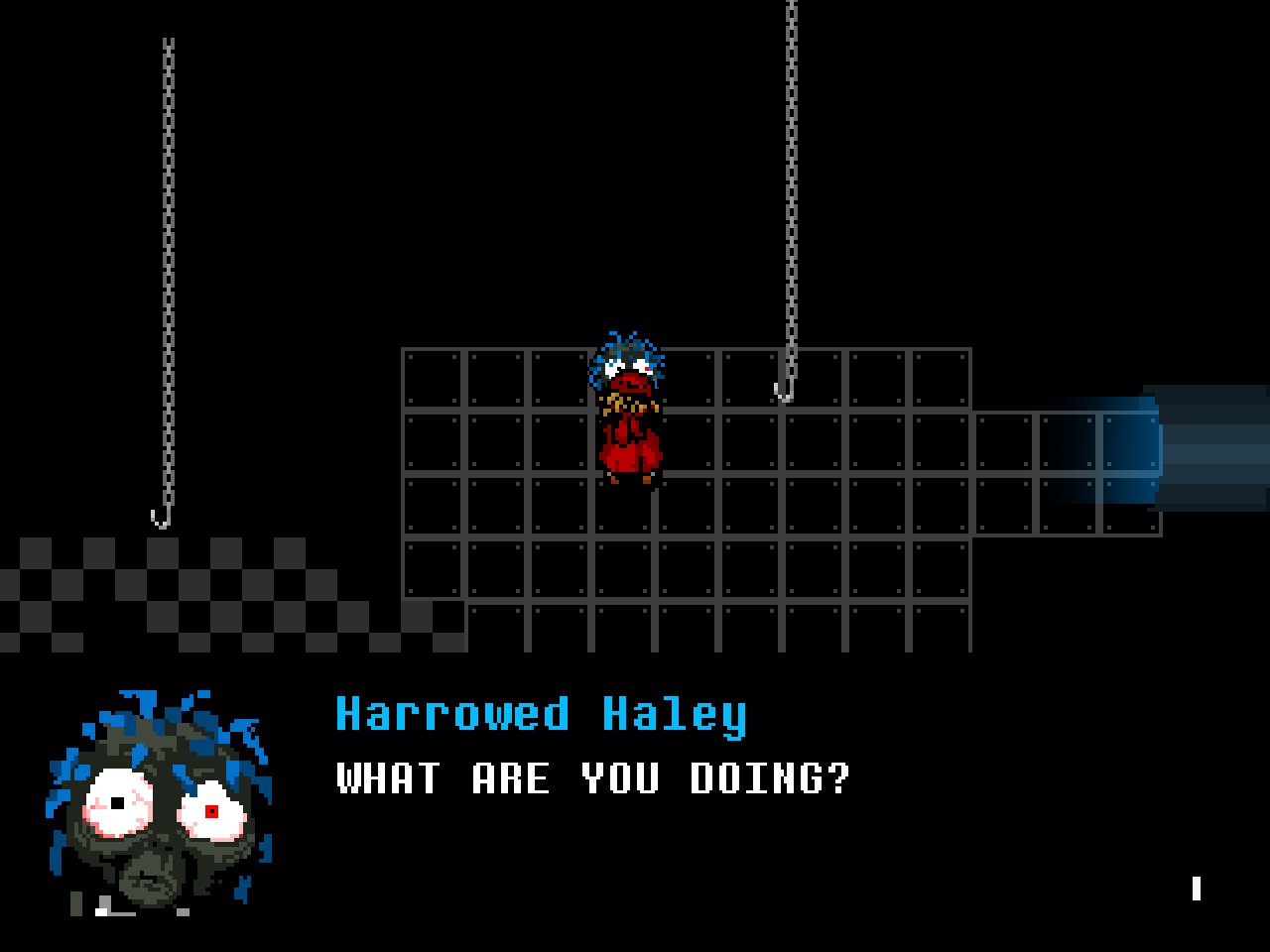
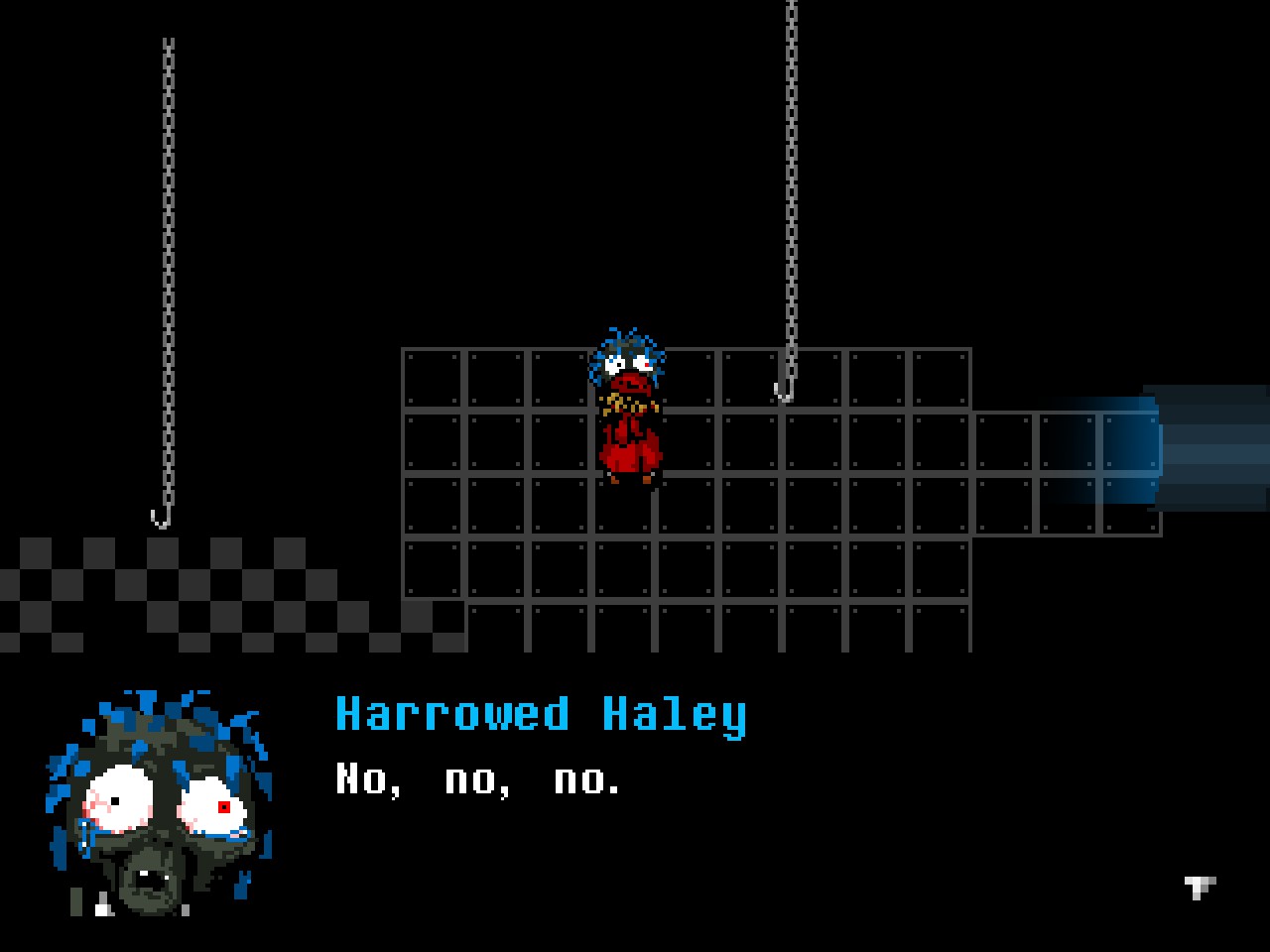
My trust was not rewarded. Harrowed Haley becomes perfectly lucid as you kill them, begging for their life, too late for you to stop the deathblow.
It felt absolutely horrible to me, and not in a good way. Act 2 leans heavily on trying to make you feel guilty, and I get that, but the part with Harrowed Haley just felt inappropriate and cruel. It felt like a nasty bait and switch.
I'm still not ready to really talk about Harrowed Haley. We will come back to them. Because it gets worse. Somehow, it gets worse.
There's a minor missed opportunity I need to mention here: remember how I said that the Cursed Castle has a consciousness? That it spoke to you, and seemed to have a soul of its own? It's something that the game emphasizes when you're first exploring it, with multiple characters commenting on it to really hammer it home. Your goal in this part of the game is to hunt down every living soul. So I was really excited to see how that was going to pay off: how do you fight a castle? How do you find and kill the soul of a castle?
The answer is: you don't. It just doesn't come up. I don't get it. Anton Chekov is rolling in his grave.
Also, something weird about this whole section is how it's emphasized that Red is the only one in this realm with the power to kill. But also, 15 minutes into the game, you're introduced to The Incinerator, which kills you. And also Purple Mage threatens to kill you. So what gives? Why is this your job? Why can't Frog do it themself?
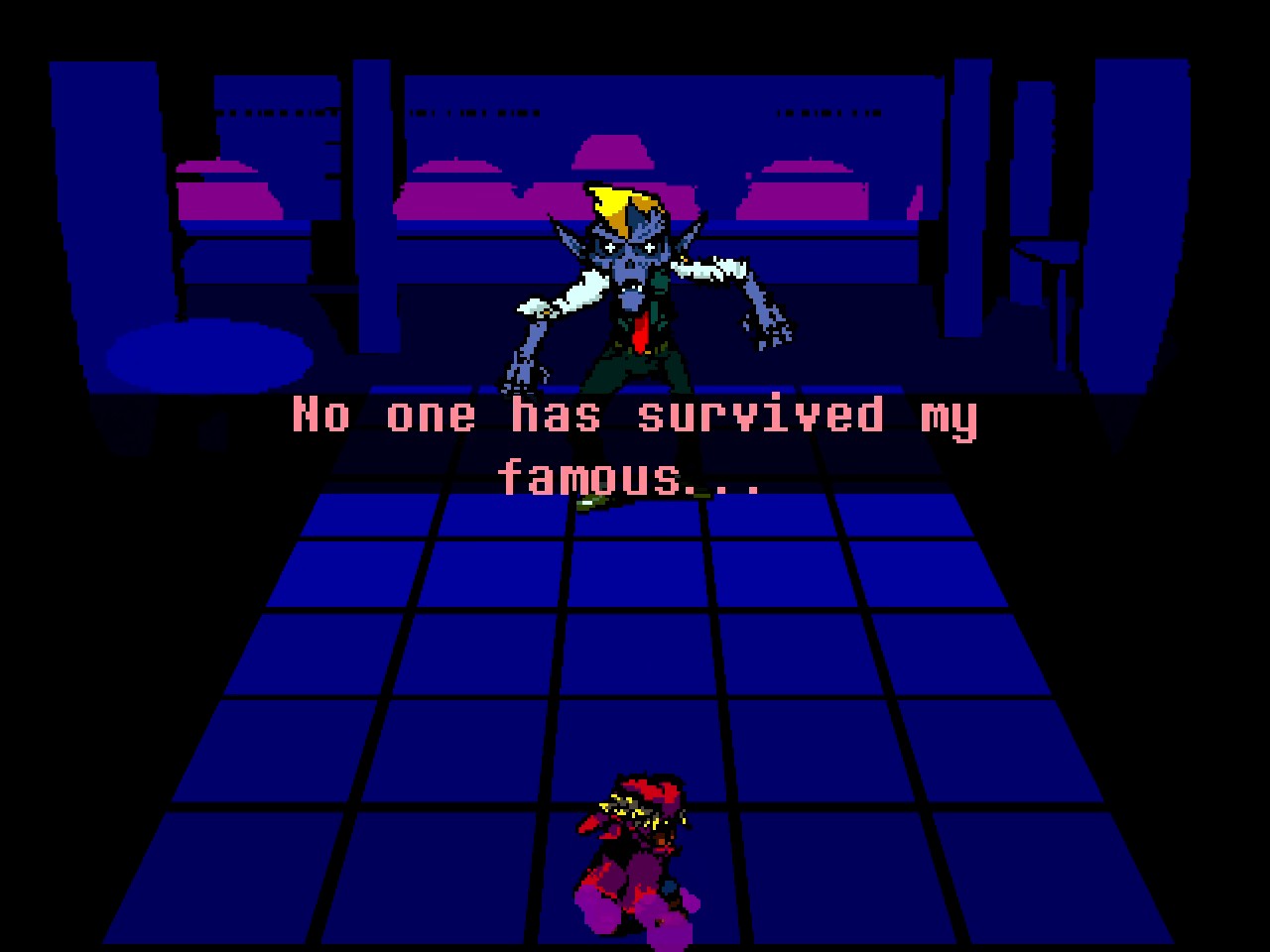
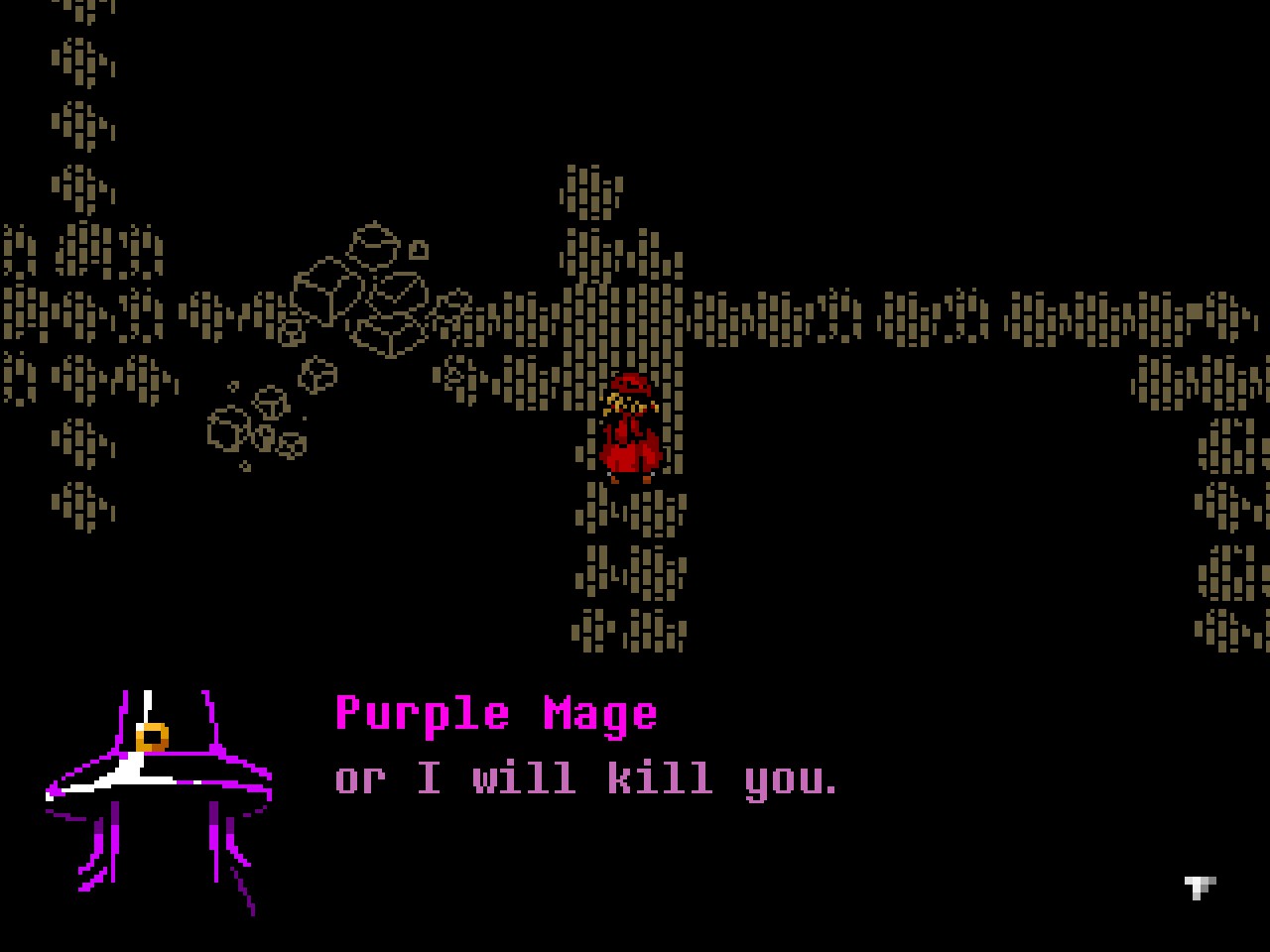
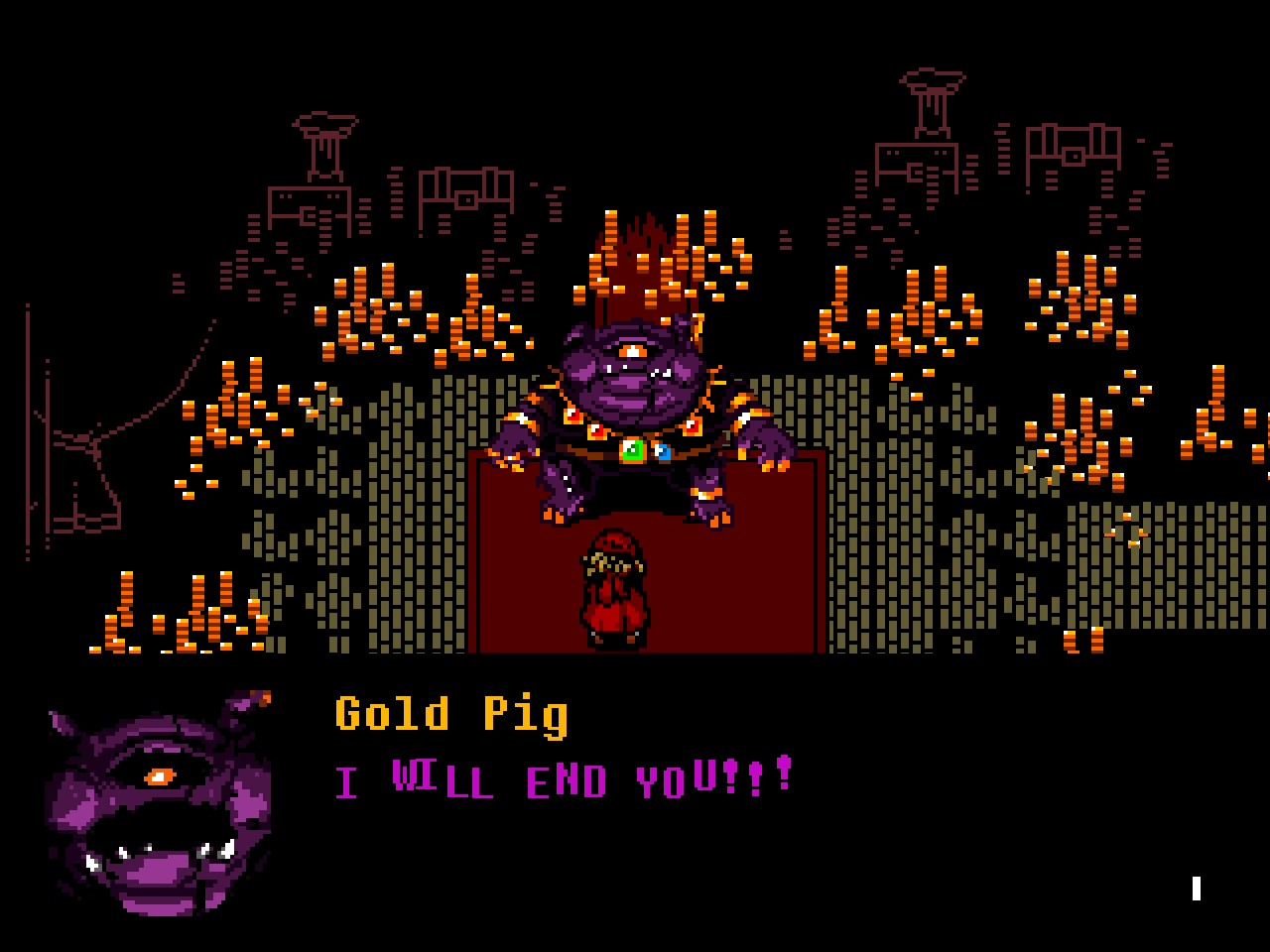
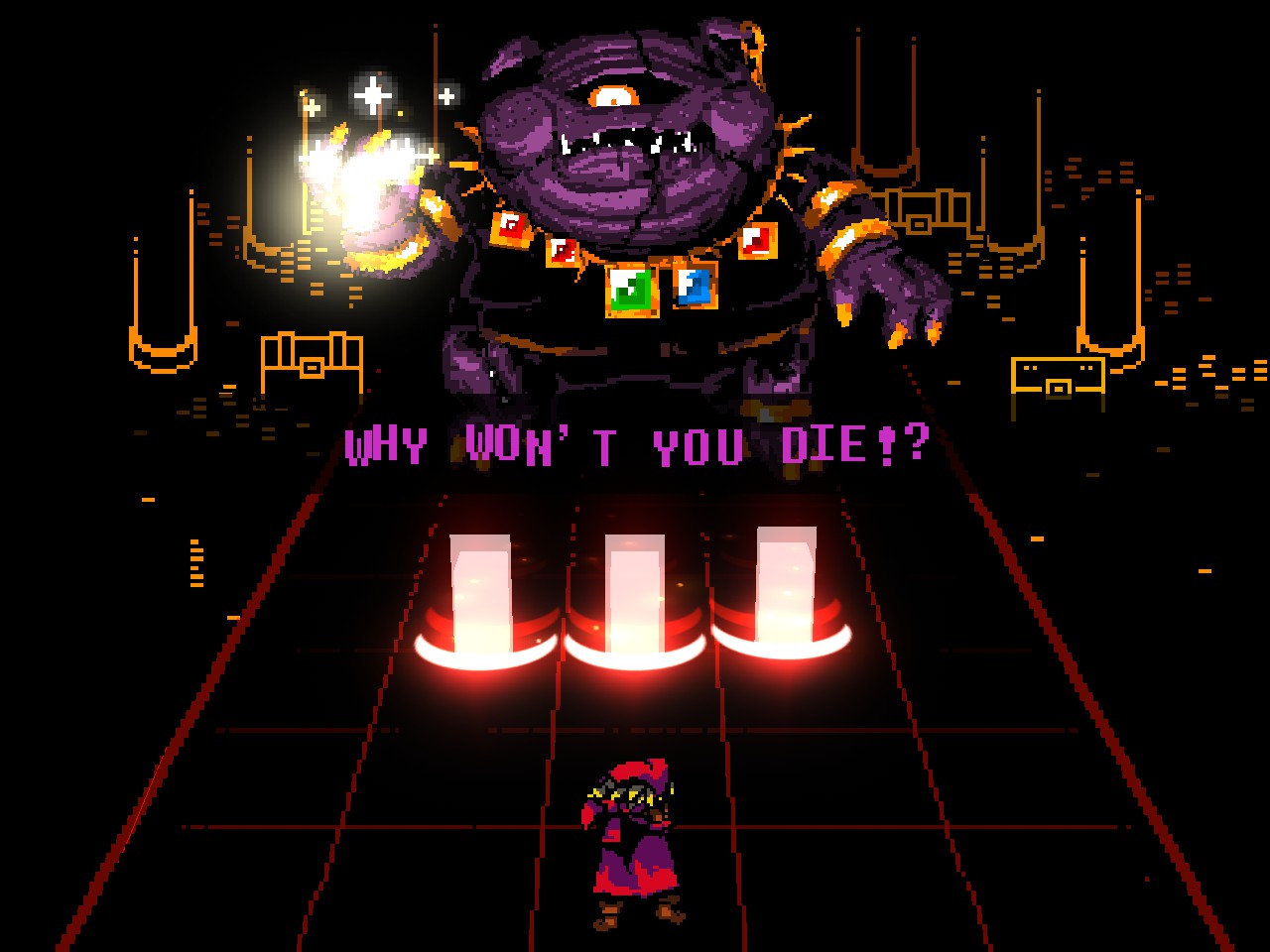
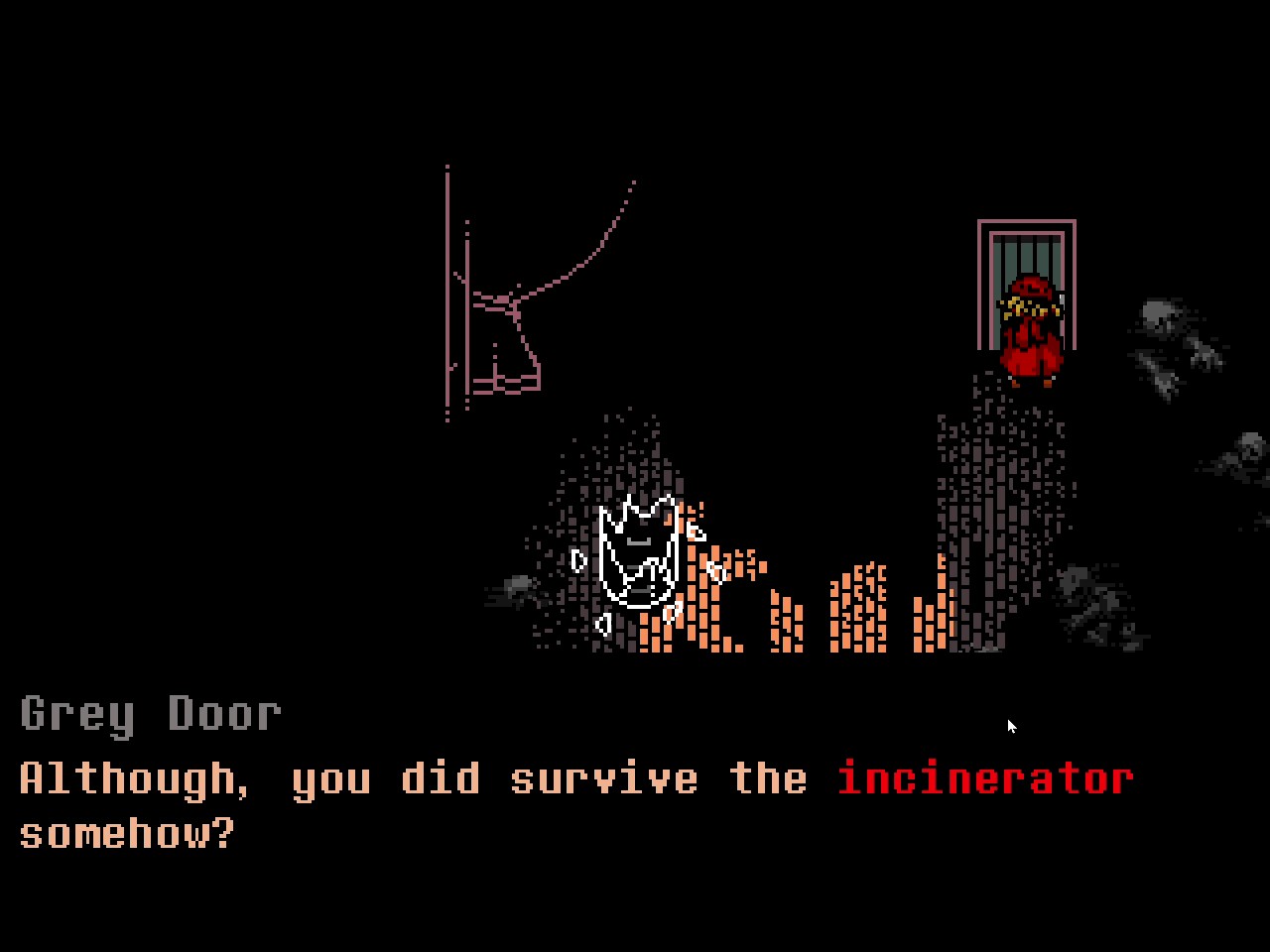
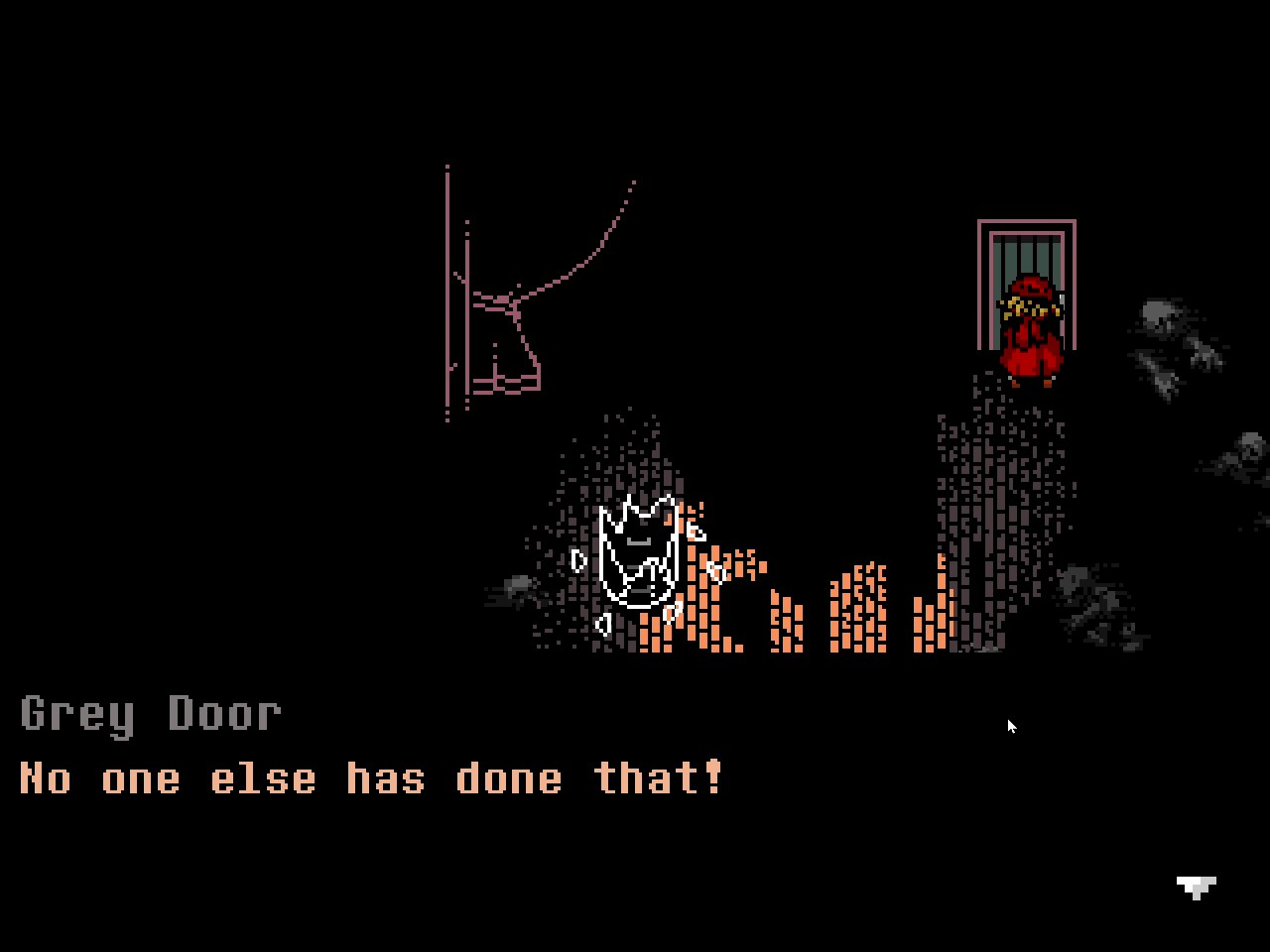
It feels like the devs genuinely forgot that Red was supposed to be the only one with Power of Death when they introduced the Incinerator and the various threats of death made throughout the game. I don't know how to explain it. Again, not to CinemaSins this game, but it just further cements that feeling of "they improvised the script and didn't bother going back to revise it properly when later worldbuilding decisions demanded it."
On that note, during this part of the game, Purple Mage and Green Mage seem like they definitely don't want to die, but they also seemed totally cool with you getting your arm back at the end of Act 1? It doesn't feel like they're simply resigned to their fate. When you defeat Gold Pig, they don't seem even a little upset that they failed to stop you from reaching your arm. It just feels inconsistent: like instead of writing their dialogue with the whole story in mind, they just wrote for the current scene. Improvision, without proper revision.
Maybe the implication is that the mages have a death wish?? But they don't mention this either on the cusp of you getting your arm back, nor when you hunt them down to kill them later.
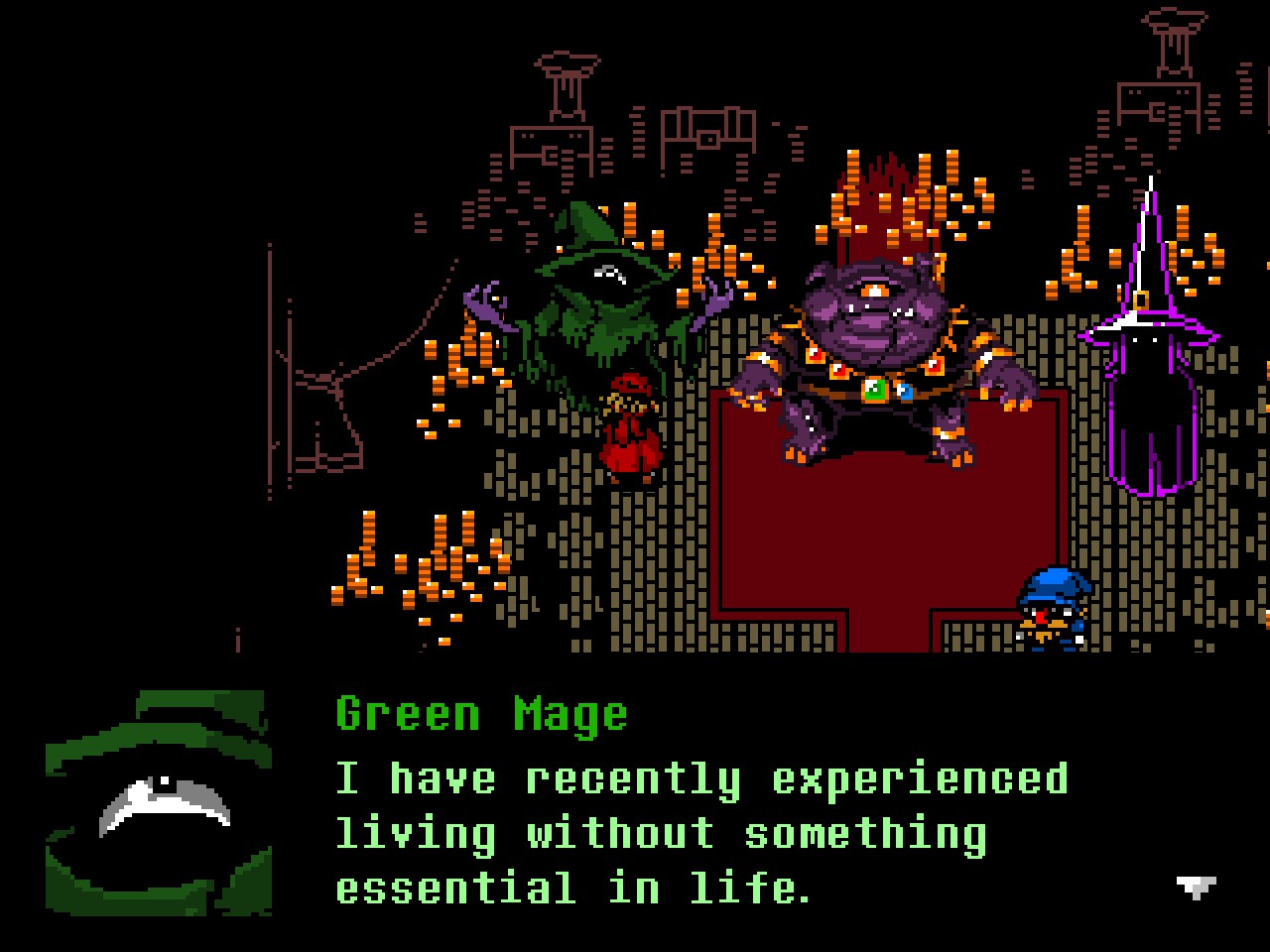
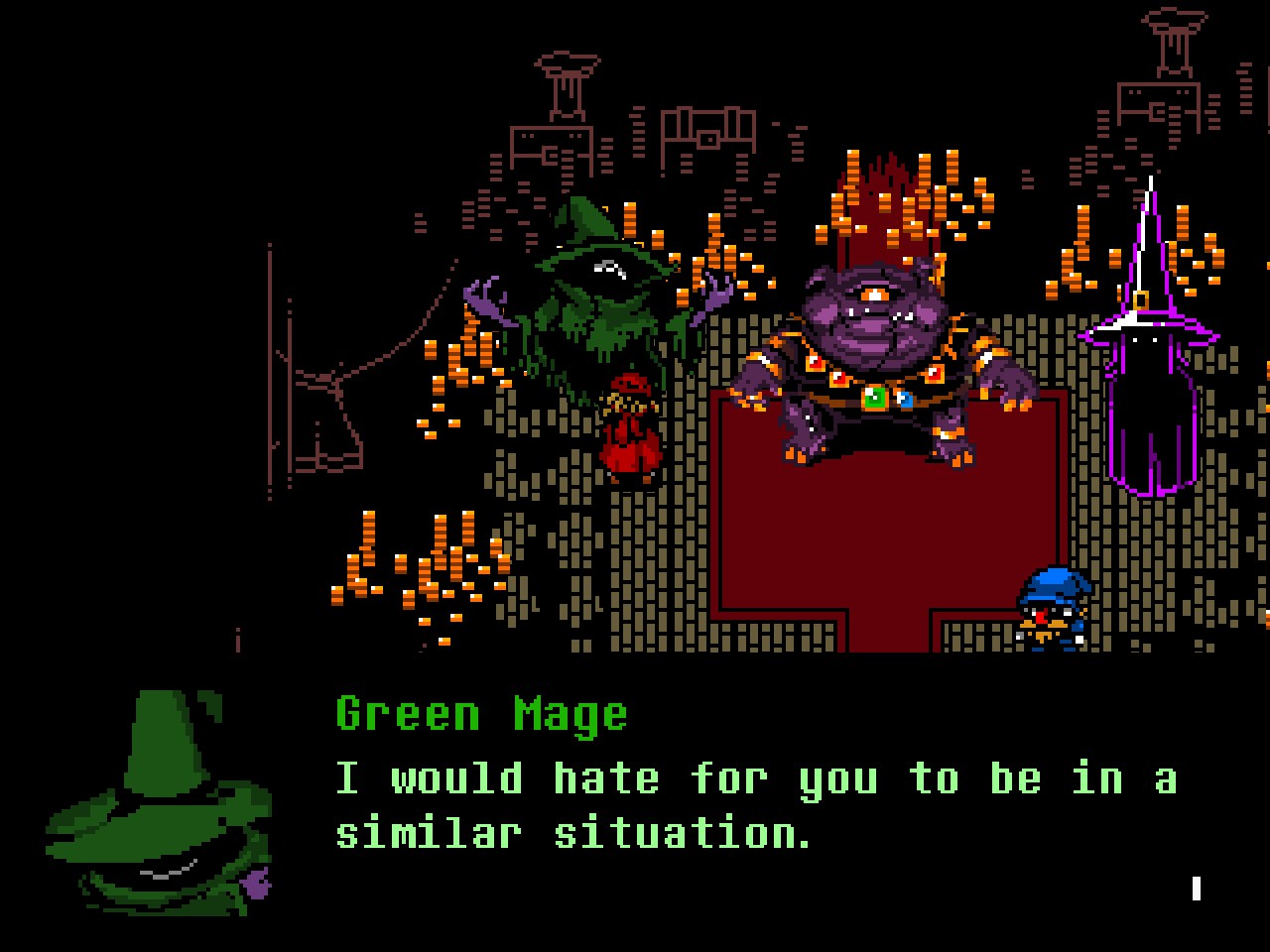
The Mages seem to agree with Gold Pig's initial plan to keep your arm, and then don't protest you reclaiming it once you've trounced them in battle. Gold Pig doesn't protest and say giving the arm back is dangerous, like you would expect them to. Instead, Gold Pig simply insists that you "buzz off" after you take the arm, as if they only remember Red's arm is a murder weapon after the scene has finished.
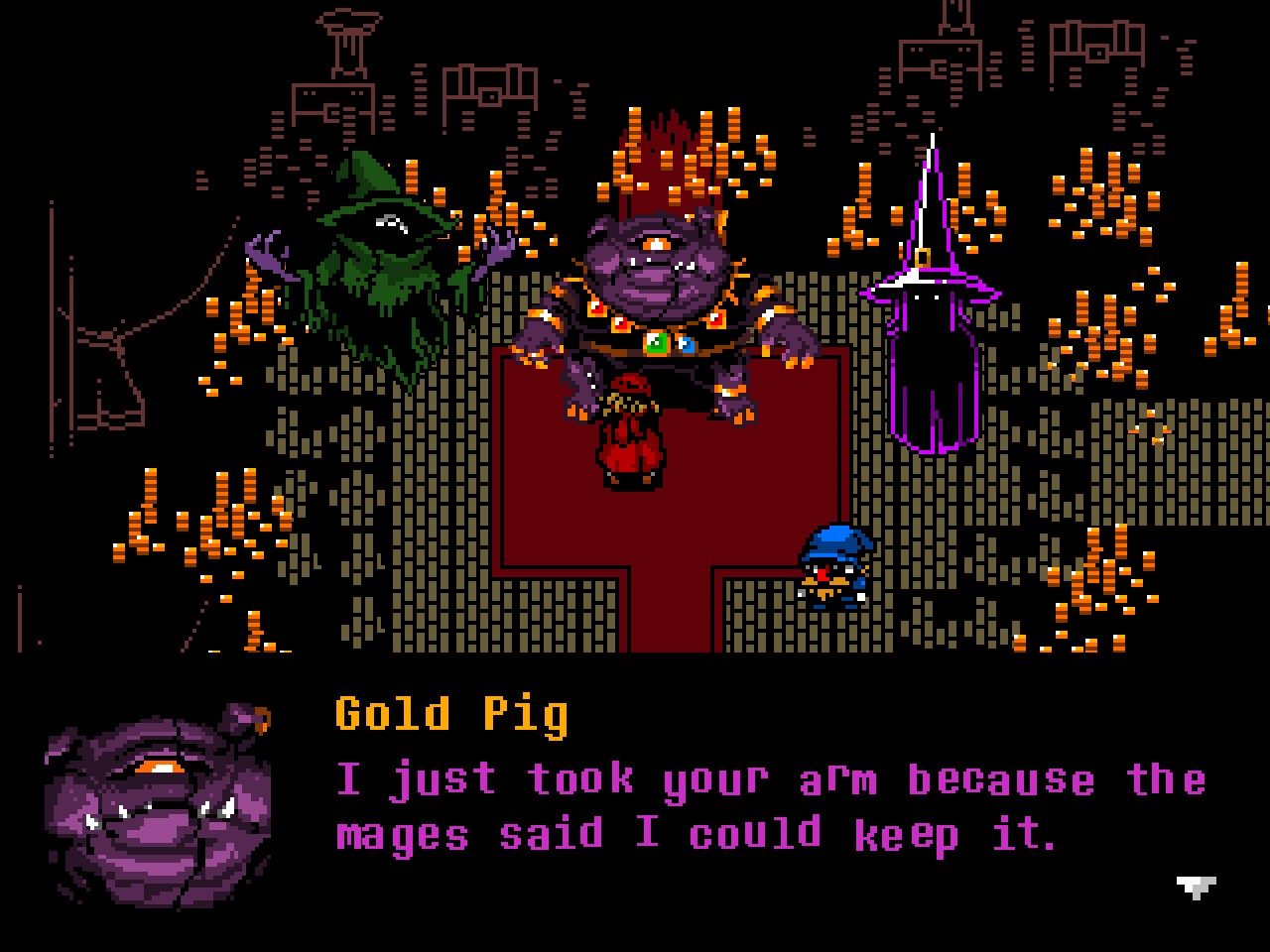
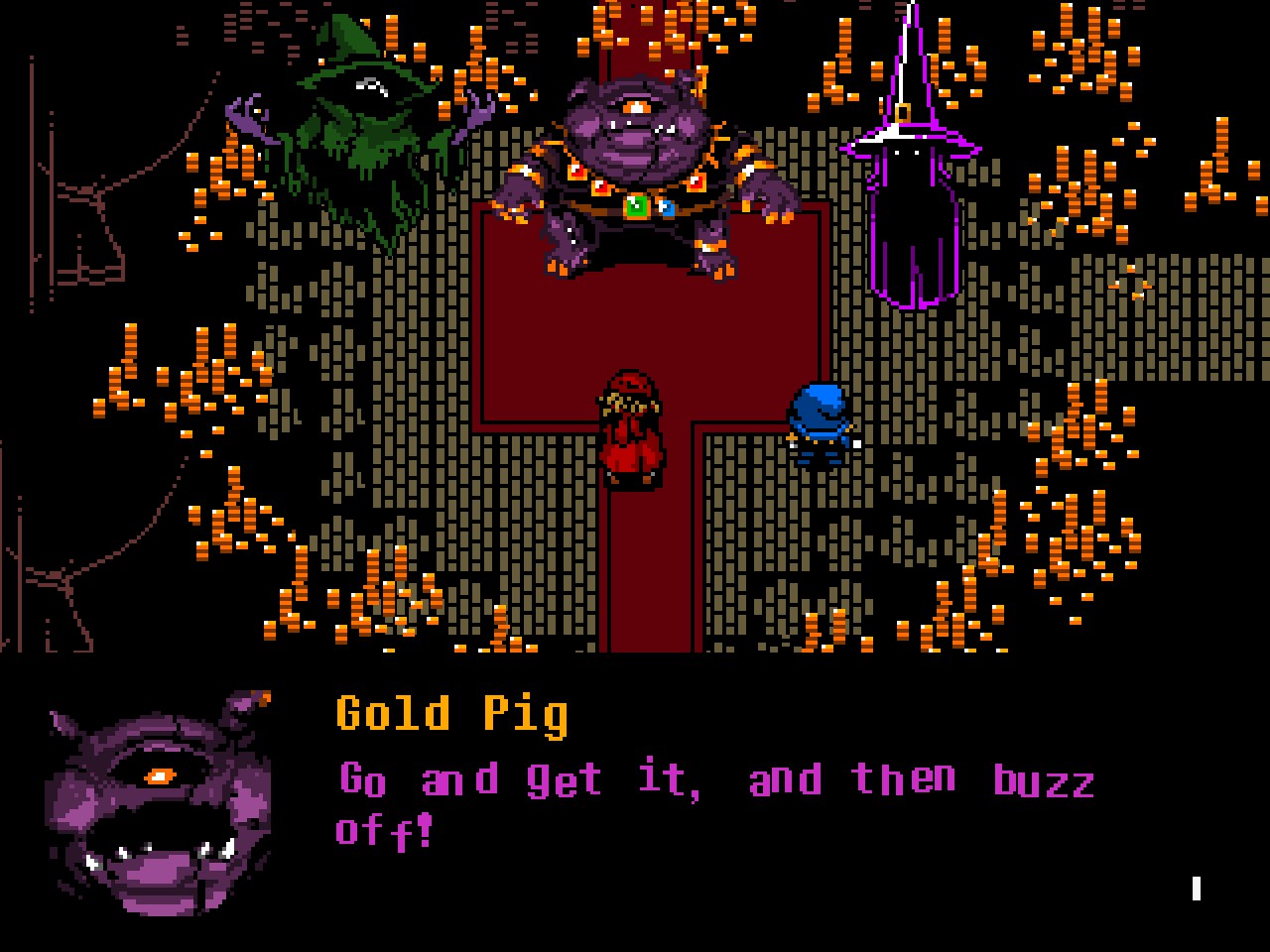
For that matter, why are they even mad at Gold Pig? If Gold Pig stealing your arm stopped you from murdering everyone, doesn't that make Gold Pig a hero? The game tells you that you're supposed to see Gold Pig as a gluttonous, greedy monster, but then it fails to have them do any actual harm with their greed. Beyond delay your righteous genocide, I suppose.
I feel like the game's emotional narrative depends entirely on recognizing the tropes and ignoring the actual implications. There's nothing wrong with tropes, but you have to be thoughtful in how you employ them! You're supposed to feel bad about refusing Frog's Call To Adventure, even though their Call To Adventure is "Do A Genocide". You're supposed to hate Gold Pig because he's The Final Boss Character, but Gold Pig doesn't really do anything objectionable besides steal Blue Thief's legs! Being a wealthy bastard isn't especially villainous when no one else is suffering due to a lack of wealth, but that's how they're treated by the dialogue.
Oh, while we're talking about the Mages: You also learn through another loredump note that each of the Mages sacrificed at least one of their senses to create "soulbound gems" that would enhance their power. I thought "soulbound gems" would end up having something to do with the necklace of gems around Gold Pig's neck, seeing how they command Purple and Green Mage, but I don't remember this worldbuilding element coming up again at all. I thought that, at the very least, one of the mages would end up talking about which senses they sacrificed for their power, but nope. Every single mage seems to have given up their eye(s), except for Purple Mage, whose gem seems to have been installed where their heart is.
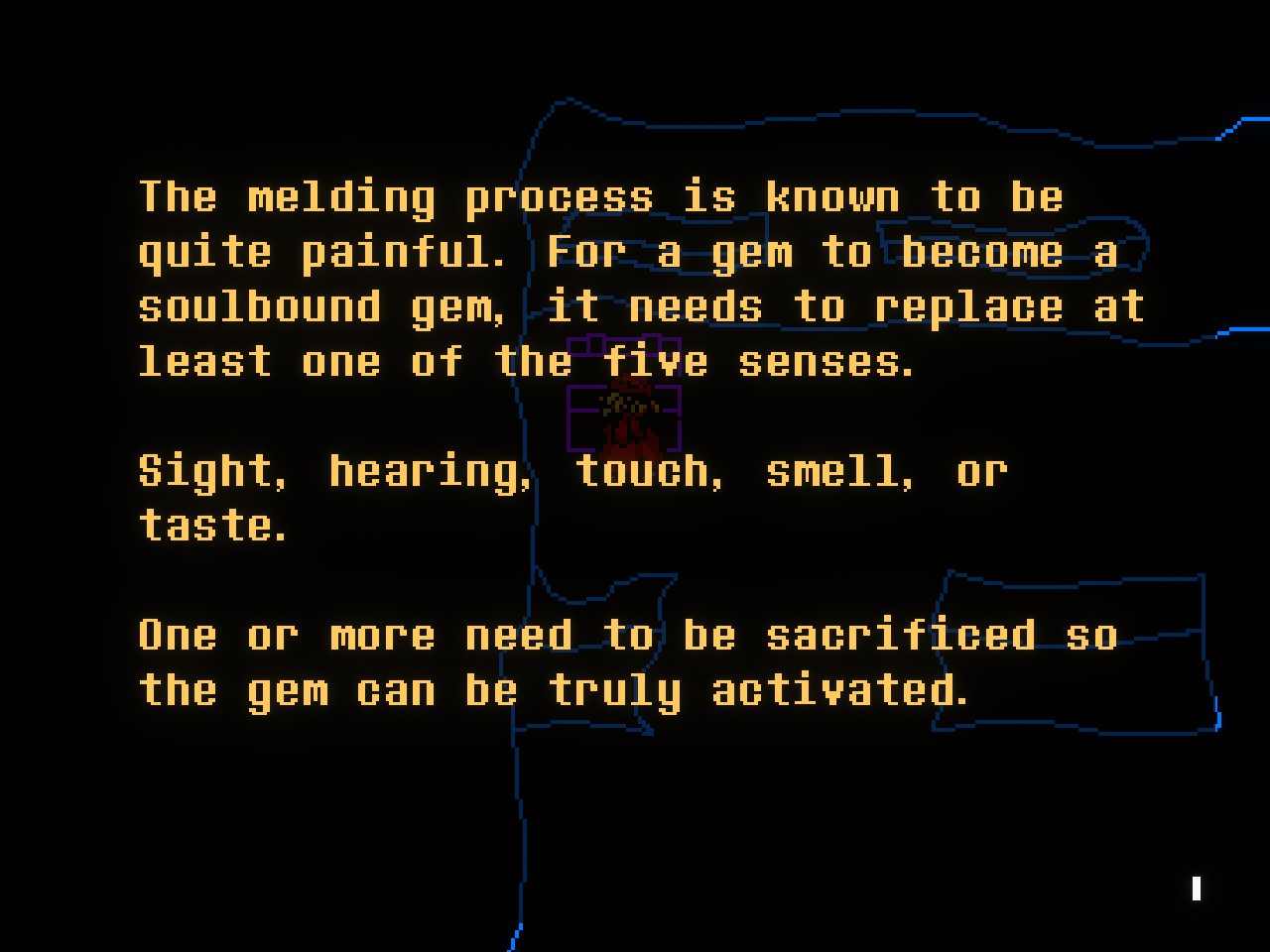
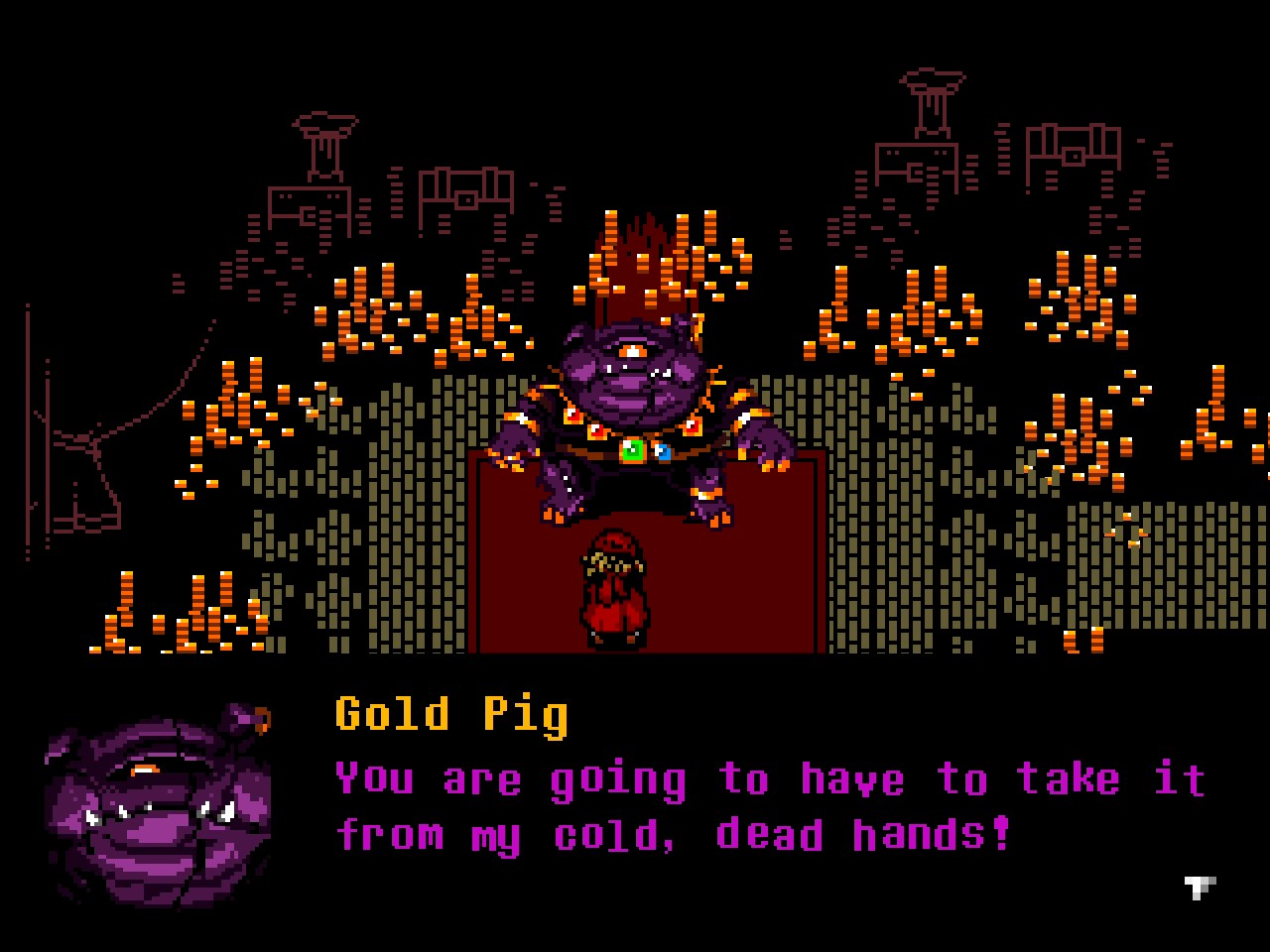
Anyway, to help you in your mission... do you remember that magic 8-ball I mentioned, which tells you how many souls are left in the realm? Well, that's how you know how close you are to completing your task. You get to see the number fall by 1 every time you end someone's life. It's a good touch, and gives you a constant sense of build-up as the number ticks down. The end is coming. It is inevitable.
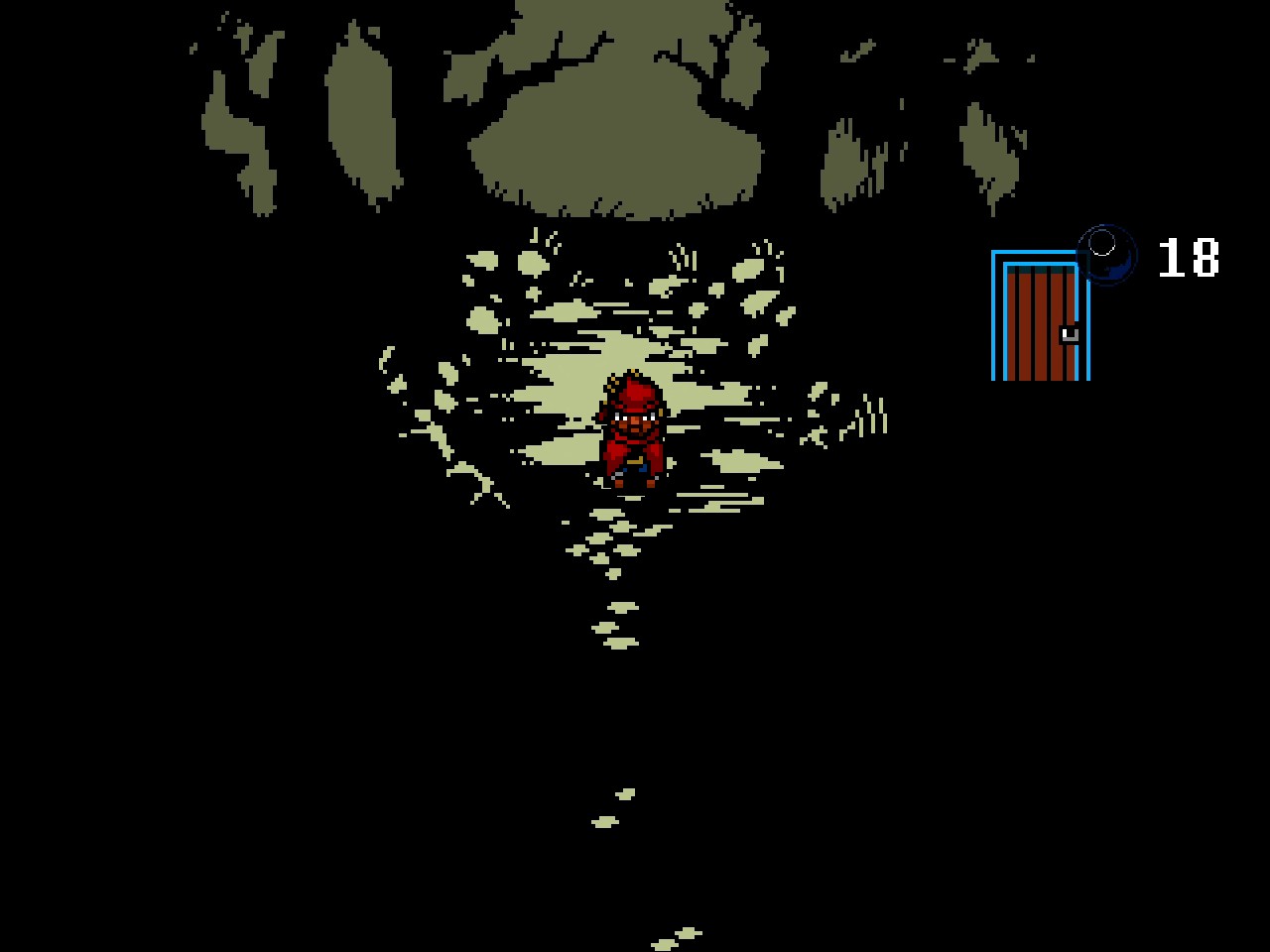
30 souls.
20 souls.
10 souls.
5 souls.
4 souls.
3 souls.
2 souls.
1 soul.
At this point, you are told to go visit a court of Lost Souls, spirits that look like discount Gasters broken, distorted masks. "Go to the court of the lost spirits," you're told. You'll need their help to release the final soul.

One soul left. One soul left to kill. What a moment it is.
Who's even left, after you've killed everyone else?
That's right. It's you.
It's time to die.
